finding home.
the photo issue
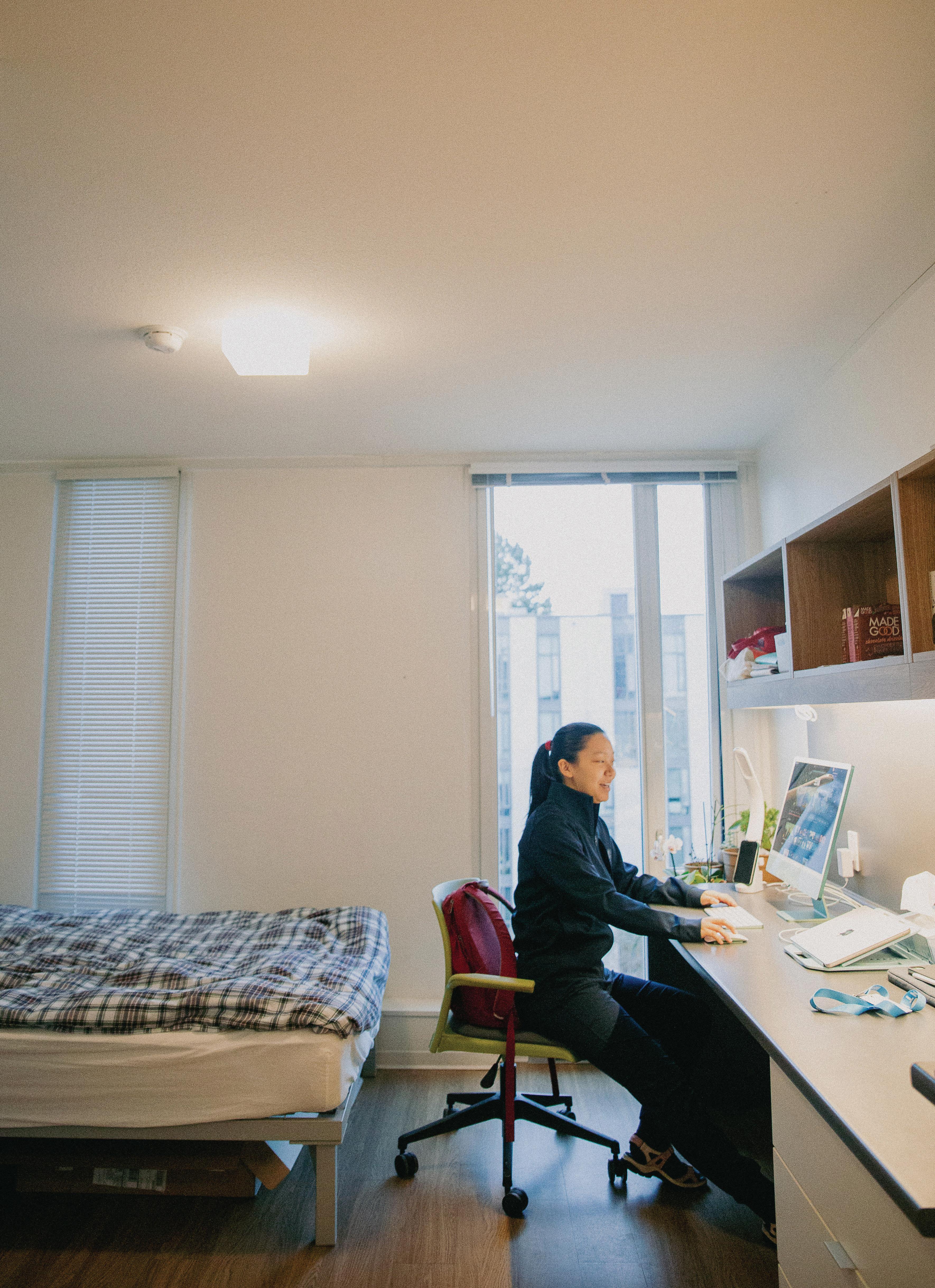
U THE UBYSSEY JANUARY 17, 2023 | VOLUME CIV | ISSUE XII HOME AWAY FROM HOME SINCE 1918
02 • january 17, 2023 • finding home
Editor SOPHIA RUSSO science@ubyssey.ca
+ Rec
Manango, Jerry Wong, Jocelyn Baker, John Chen, Julian Forst, Kaila Johnson, Khushi Patil, Lauren Kasowski, Lucas Ortolano, Makyla Smith, Manya Malhotra, Maria Radivojevic, Matthew Asuncion, Maya Levajac, Polina Petlitsyna, Shanai Tanwar, Shane Atienza, Shubhreet Dadrao, Rachel Marr, Shereen Lee, Shruthi Chockkalingam, Sidney Shaw, Spencer Izen, Tatiana Zhandarmova, Thomas McLeod, Ximena Gordillo Cruz, Zoe Wagner
We wish to acknowledge that we work, learn and operate this paper upon the occupied, traditional, ancestral and unceded territory of the Coast Salish peoples, including the xʷməθkʷəyəm (Musqueam), Sḵwxwú7mesh (Squamish), Stó:lō and səli lwətaɁɬ/Selilwitulh (Tsleil-Waututh).
Science editorial business contact staff land acknowledgement legal
The Ubyssey is the official student newspaper of the University of British Columbia (UBC). It is published every second Tuesday by the Ubyssey Publications Society (UPS). We are an autonomous, democratically-run student organization and all students are encouraged to participate.
Editorials are written by The Ubyssey’s editorial board and they do not necessarily reflect the views of the UPS or UBC.
All editorial content appearing in The Ubyssey is the property of the UPS.
Stories, opinions, photographs and artwork contained herein cannot be reproduced without the expressed, written permission of the Ubyssey Publications Society.
The Ubyssey is a founding member of Canadian University Press (CUP) and adheres to CUP’s guiding principles.
The Ubyssey accepts opinion articles on any topic related to UBC and/or topics relevant to students attending UBC.
Submissions must be written by UBC students, professors, alumni or those in a suitable position (as determined by the opinion editor) to speak on UBC-related matters. Submissions must not contain
racism, sexism, homophobia, transphobia, harassment or discrimination. Authors and/or submissions will not be precluded from publication based solely on association with particular ideologies or subject matter that some may find objectionable. Approval for publication is, however, dependent on the quality of the argument and The Ubyssey editorial board’s judgment of appropriate content.
Submissions may be sent by email to opinion@ubyssey.ca . Please include your student number or other proof of identification. Anonymous submissions will be accepted on extremely rare occasions. Requests for anonymity will be granted upon agreement from four-fifths of the editorial board. Full opinions policy may be found at ubyssey. ca/pages/submit-an-opinion
For some of us, it’s a place we have to leave at some point, but can look forward to eventually returning to.
For others, it’s something we’ve found in the people we’ve met at university.
In a more literal sense, finding home in Vancouver has become increasingly difficult due to scarce and costly housing.
This issue explores the various ways students find home, be it through cultivating a living space, creating a safe place within their own body or connecting with loved ones on the other side of the world.
This issue is dedicated to everyone who has worked to construct their sense of home and those still trying to find it.
Isabella Falsetti Photo Editor

JANUARY 17, 2023 | VOLUME CIV | ISSUE XII
Coordinating Editor CHARLOTTE ALDEN coordinating@ubyssey.ca News Editors NATHAN BAWAAN & ANABELLA McELROY news@ubyssey.ca Culture Editor TOVA GASTER culture@ubyssey.ca Features Editor PALOMA GREEN features@ubyssey.ca Opinion + Blog Editor IMAN JANMOHAMED opinion@ubyssey.ca Business Manager DOUGLAS BAIRD business@ubyssey.ca Account Manager FOREST SCARRWENER advertising@ubyssey.ca Web Developer KEEGAN LANDRIGAN k.landrigan@ubyssey.ca Web Developer BRITTANY SAMPSON b.sampson@ubyssey.ca Editorial Office: NEST 2208 604.283.2023 Business Office: NEST 2209
6133 University Blvd.
1Z1 Aditi Mankar, Aisha Chaudhry, Amanda Yee, Annaliese Gumboc, Anya Anber Ameen, Bea Lehmann, Bernice Wong, Bessie Guo, Brendan Ngo, Bridget Meehan, Charles Brockman, David Collings, Elena Massing, Farzeen Ather, Fiona Sjaus, Gloria Rahgozar, Helen Shen, Himanaya Bajaj, Isabella Maggiore, Isa You, Jackson Dagger, Jasmine Cadeliña
the ubyssey
604.283.2024
Vancouver, BC V6T
Sports
Editor
Web Developer
It is agreed by all persons placing display or classified advertising that if the UPS fails to publish an advertisement or if an error in the ad occurs the liability of the UPS will not be greater than the price paid for the ad. The UPS shall not be responsible for slight changes or typographical errors that do not lessen the value or the impact of the ads. m.chin@ubyssey.ca Social Media Manager SHEREEN LEE social@ubyssey.ca President JALEN BACHRA president@ubyssey.ca Website: ubyssey.ca Twitter: @ubyssey Instagram: @ubyssey Facebook: @ubyssey TikTok: @ubyssey
MIRIAM CELEBILER sports@ubyssey.ca Visuals Editor MAHIN E ALAM visuals@ubyssey.ca Photo Editor ISABELLA FALSETTI photo@ubyssey.ca Video Producer DIANA HONG video@ubyssey.ca
MEI CHI CHIN
editor’s note.
Home.
photo by Sidney Shaw cover photo by Isabella Falsetti issue design by Mahin E Alam
The Ubyssey ’s Board of Directors president’s update on progress and elections
Welcome back UBC! I hope you all had a great break.
During the 2022 portion of my term as president of The Ubyssey ’s Board of Directors, the Board has undertaken and completed several projects. Here are five things we accomplished in 2022:
1. We passed a new five-year strategic business plan which outlines marketing and strategy plans for the future of publication.
2. We began the process of expanding our secondary school scholarship program to include all schools within the Vancouver School District, reaching more students than ever before!
3. The Ubyssey ’s business office is approaching pre-COVID-19 advertising revenue levels, which will allow us to better align with our long-term financial goals and objectives.
4. The Ubyssey ’s editoral board has been re -
viewing our policies and bylaws to ensure best practices within the publication are enforced and followed.
5. Along with the editorial team, the Board is working tirelessly to increase transparency through our progress reports and financial updates.
The Ubysse y’s Board of Directors oversees the publication’s finances, business strategy, organization goals and all other day-to-day business operations of the paper. Members of the Board attend monthly meetings to discuss and vote on a number of issues and track our strategic plan progress, as well as assist on long-term projects undertaken by the president.
Being a member of the Board is a great opportunity to make an impact on the UBC community, as well as to gain valuable skills in business operations and decision making. As the current directors
complete our term, we are looking for students that are interested in building their skills in business operations and improving the student experience at UBC to join us for the 2023/24 term, with the option of extending their position to two years. The Board of Directors is a crucial piece of the Ubyssey Publications Society, and I encourage anyone interested to run!
Elections will be conducted during the annual AMS Elections. Nominations will be open until February 17, with voting open from March 6–10. Nominations can be found online at the AMS website or at the AMS offices on the third floor of the Nest. If you have any questions, email me at president@ ubyssey.ca or visit me at room 2209 in the Nest.
ADVERTISEMENT
Urgent dental care is available at UBC
The UBC Dental Clinic is currently accepting patients for an initial appointment to relieve pain and discomfort.
We provide individualized care by students and licensed, experienced supervisors in a safe and non-judgmental environment. Dental procedures are available at a significantly reduced rate.
Call 604-822-6917

finding home • january 17, 2023 • 03
Jalen Bachra Board of Directors President president@ubyssey.ca
finding home

in your living space.
Falsetti & Sidney Shaw
“Home is where the heart is.” “Home is where you hang your hat.” “There’s no place like home.”
There are countless sayings about home because it is central to our lives and who we are. It can be a literal abode, a person or even a feeling.
Here is how three UBC students define home and integrate that meaning into their living spaces.


04 • january 17, 2023 • finding home
words and photos by Isabella
angusnordlund
To Angus Nordlund, a first-year arts student, home can be both a practical place to live and an expression of self. He said home is “a place that you put a lot of your time and energy into taking care of and maintaining because you thrive in that space.”
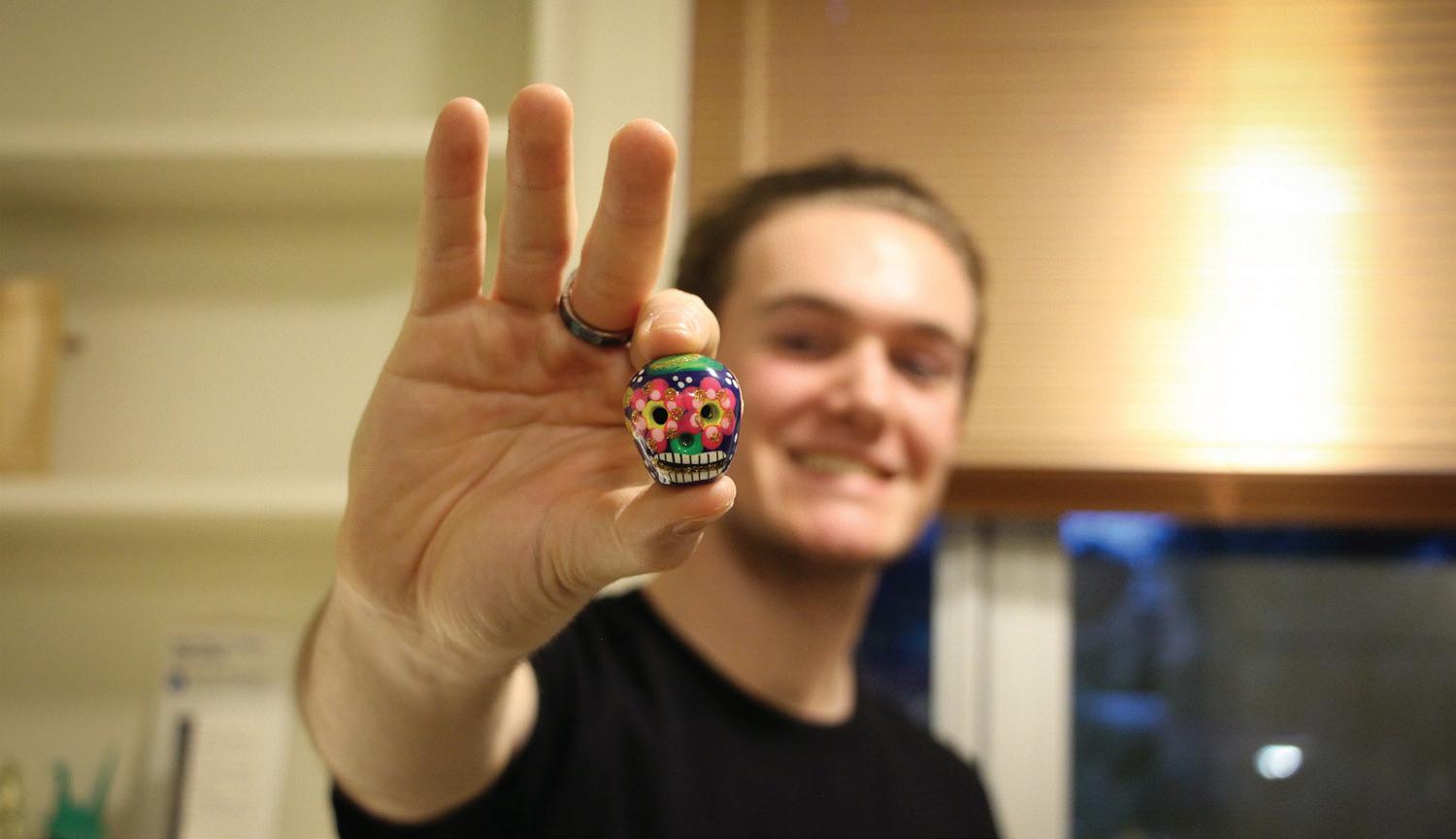
The format of the room is typical of most first-year dorms: the out-of-fashion green door, the notoriously scary 'no-tilt' desk chair and the creaky wooden mattress frame. What makes his room unique, Nordlund said, is that every part of the room has a specific purpose and a collection of objects suited to him.
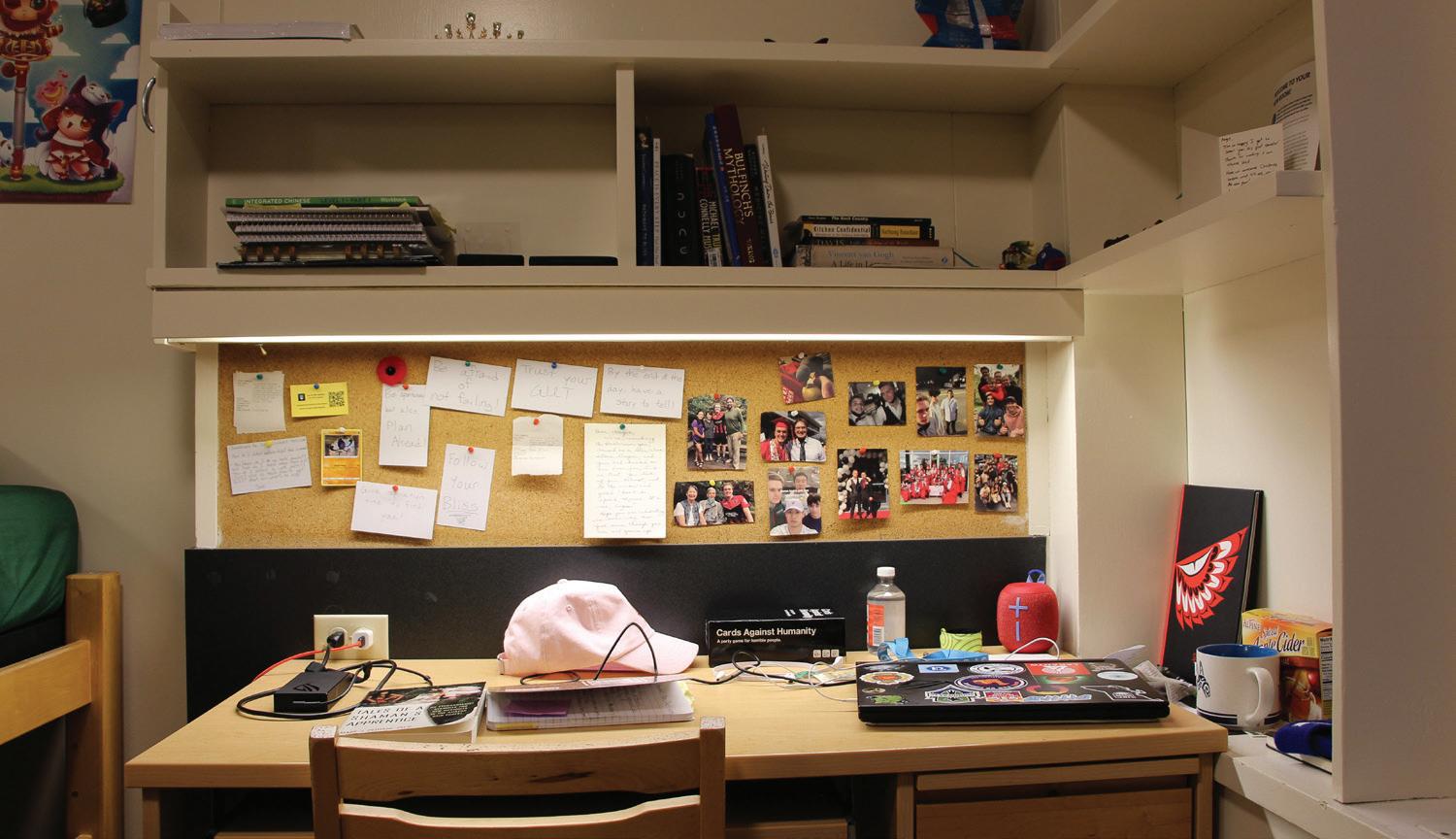
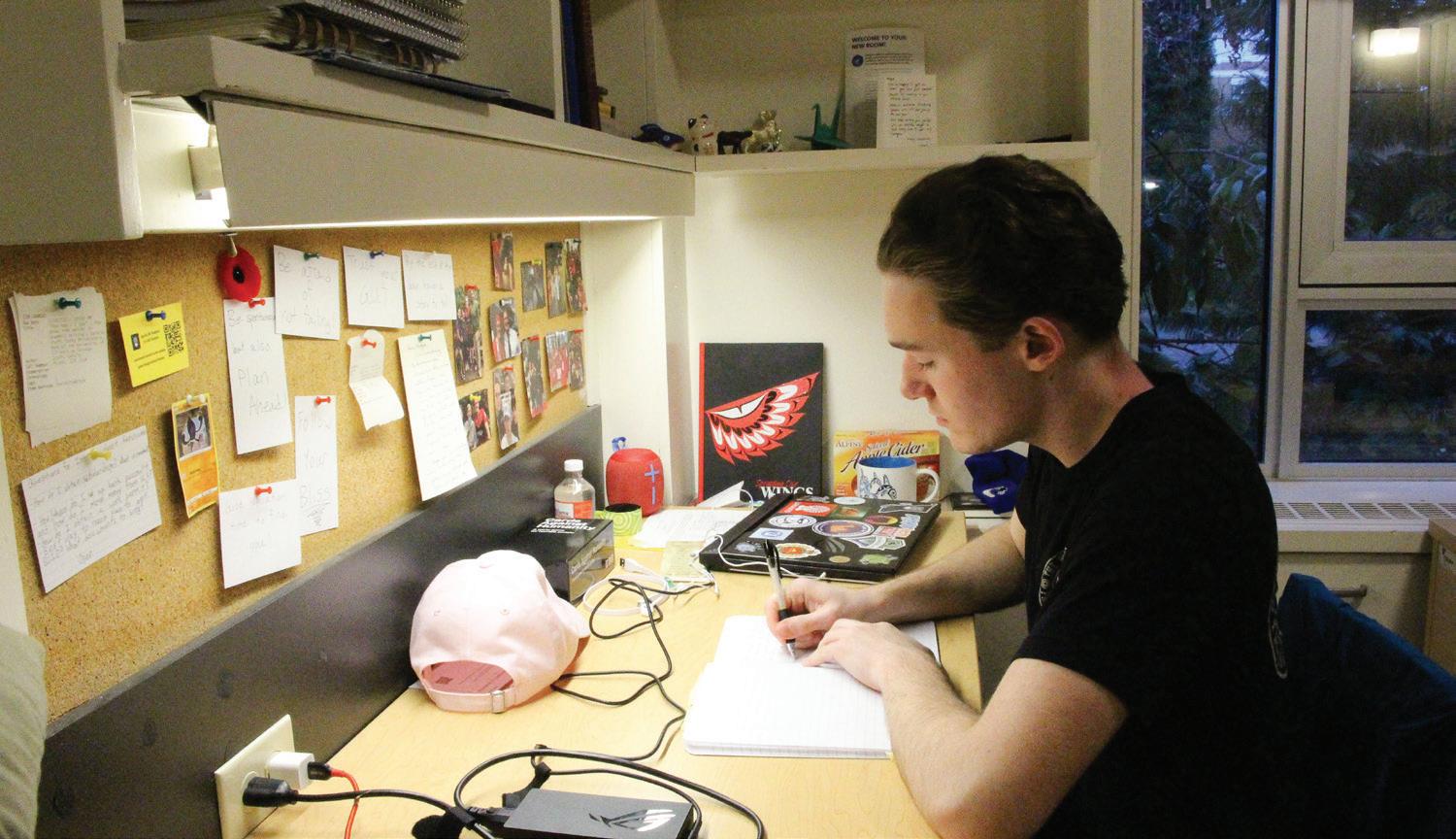
Gesturing to the many trinkets and photos that he brought from his home in Seattle, as well as the array of photos pinned on the room’s cork board, Nordlund said bringing these small mementos from homehelped remind him of his support network.
“At university you have the times where it’s tough because you’re away from family and you’re in a new space … but just knowing that you … have those people in your life to support you is extremely comforting and helps you get through the day.”
For Nordlund, there wasn’t a particular way in which he decorated his room; it was more so a process of collecting things that are significant to him and incorporating them into the space.
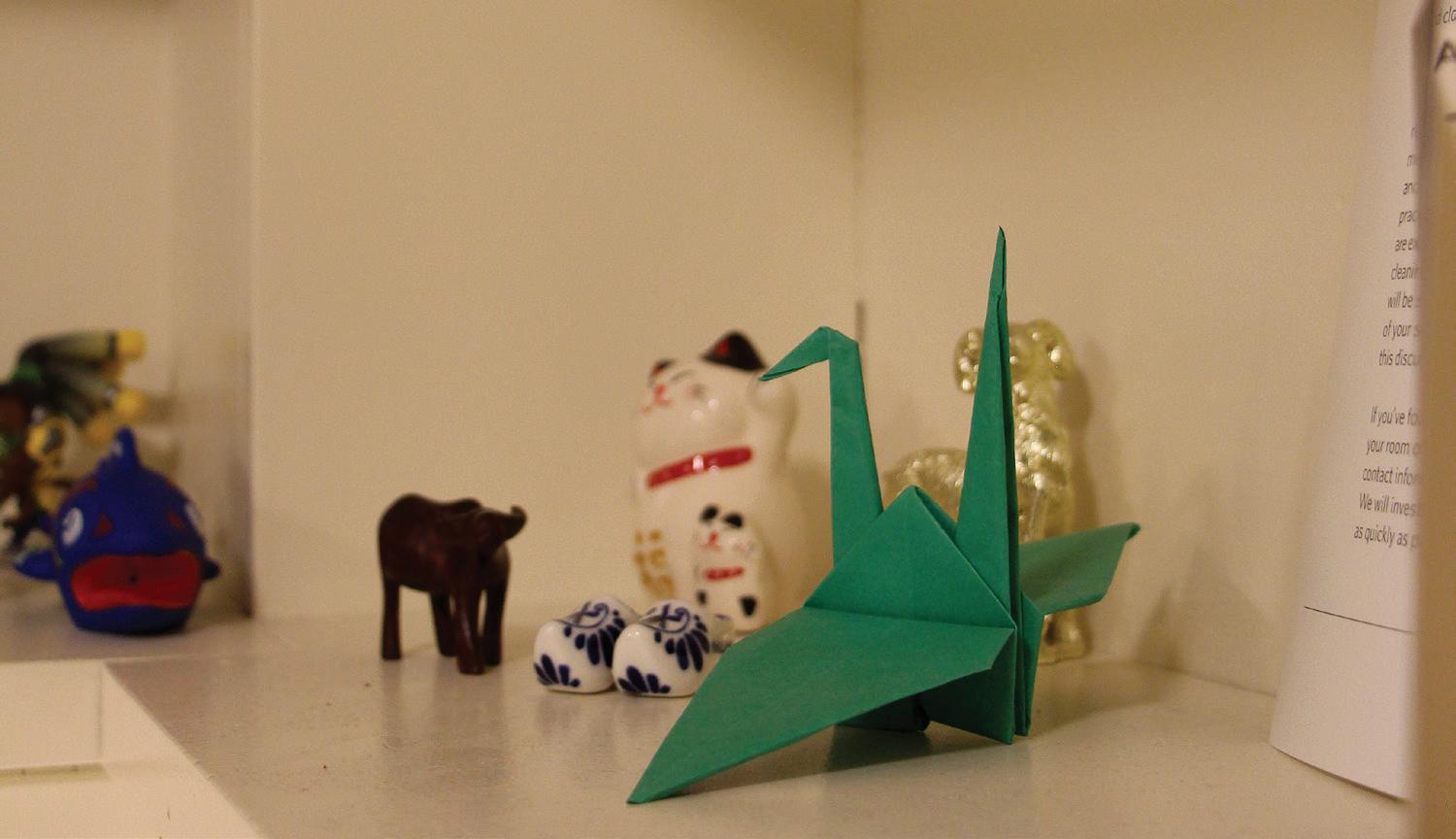
“It’s just sort of ‘go with the flow’ and stuff starts to accumulate as you get small ideas from time to time,” he said. “It becomes an expression of your thoughts and moods throughout your time here.”
When asked if he had any advice for first years who are nervous about moving into a dorm, he said students may surprise themselves with how quickly they can adapt to their new living spaces. He advised them to just do what works for them.
“Don’t worry about thinking that you have to have [your room] a certain way or that there’s a correct way to do it. If you do it your way it becomes more familiar to you and it feels almost like you’re back home because that’s what made home for you.”
finding home • january 17, 2023 • 05
you can feel comfortable 06 • january 17, 2023 • finding home
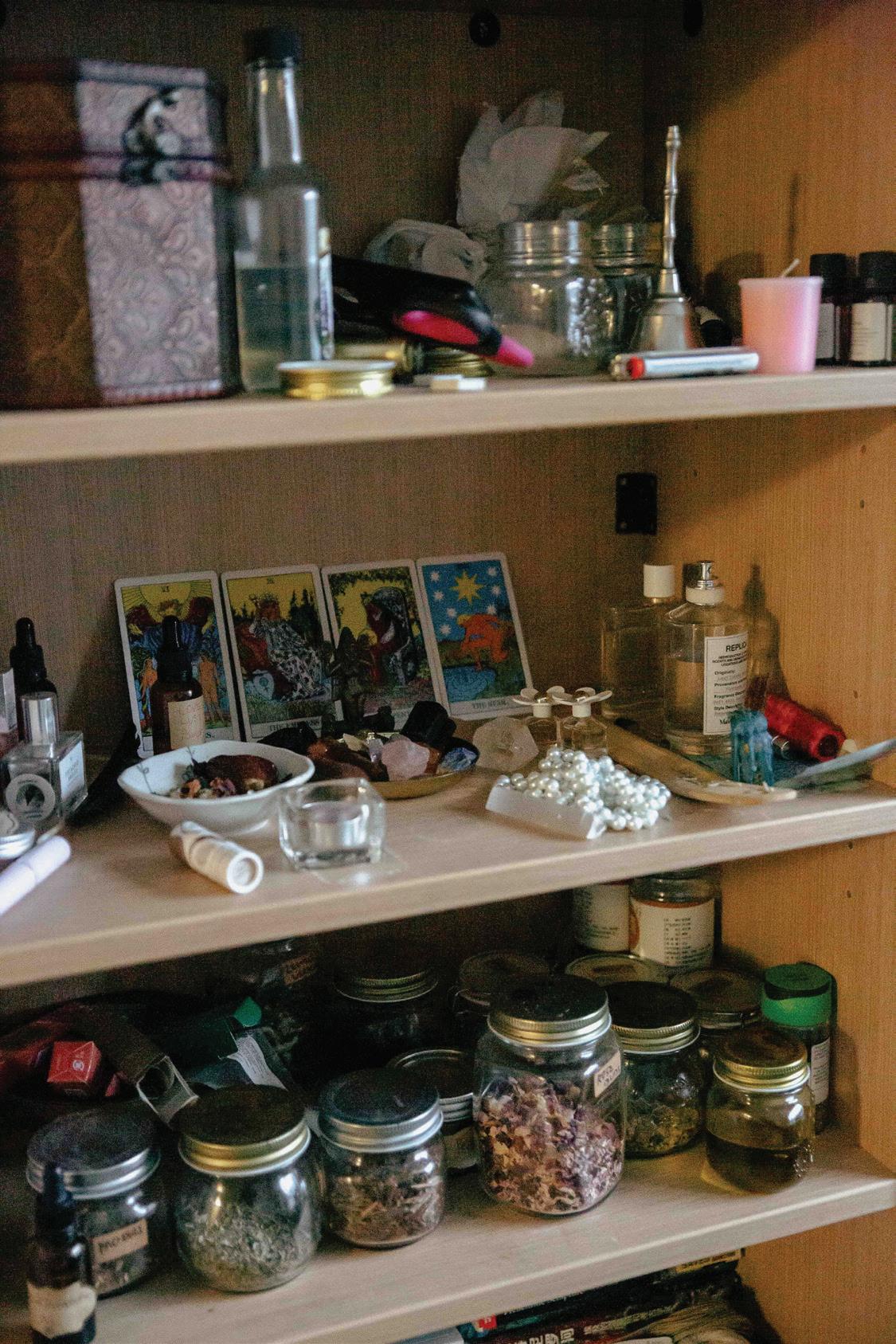
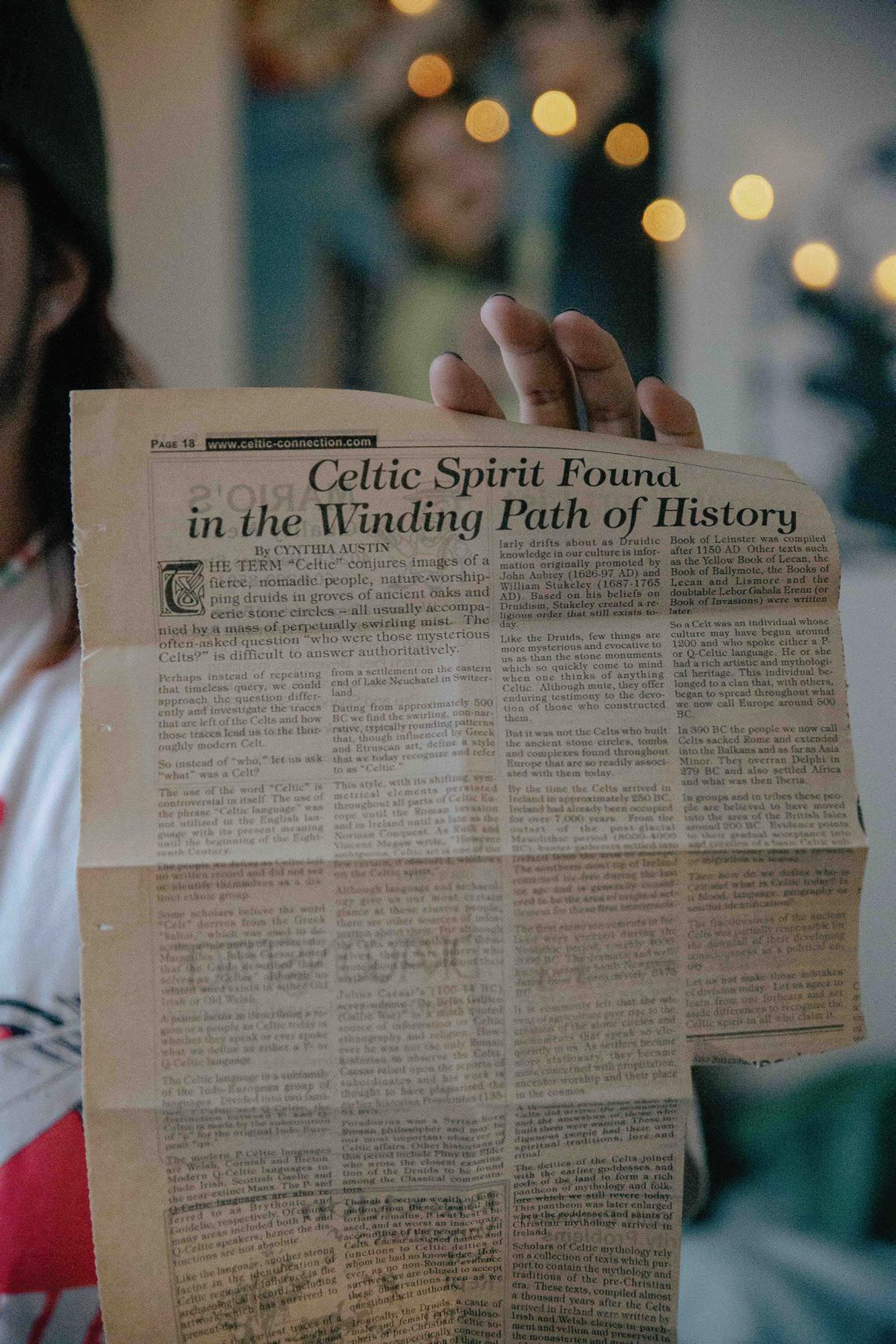

Home is where doing anything. “ “
For Chuzheng Tan, a third-year ancient Mediterranean and near Eastern studies major, “home is where you can feel comfortable doing anything.”
He described himself as “not much of an outdoorsy person,” which makes cultivating his own indoor space all the more important. It’s a safe space where he can express himself freely without being concerned about what others think, he said.
Tan’s personality and values are reflected everywhere you turn in his room. Above his bed hang posters of various celebrities: Lana Del Rey, Marilyn Monroe, Lady Gaga, Audrey Hepburn. He admires these figures because they’re “controversial” and “have a profound influence in [his] life and how [he] interacts with the world.”
He also has some satirical political posters and parodies, including one of Mao Zedong with the head of a cat titled “Chairman Meow.” In another, Van Gogh reclines in a convertible with the Mona Lisa. In a third, Communist leaders and thinkers don party hats underneath the words, “Welcome to the
chuzheng tan
Party.” Tan said he doesn’t necessarily agree with the views of these figures, but enjoys the humour and creativity of their caricatures.
On the other side of the room, a statue of Athena, the Greek goddess of wisdom and battle strategy, sits on his desk. It serves as motivation to stay on task.
“As students, our main battles that we’ll often go on is [to finish] our schoolwork,” Tan said.
To the left of his desk, a shelf on Tan’s bookcase is dedicated to another deity: Ishtar, the Mesopotamian goddess of love and fertility. The shelf combines his academic interest in ancient Mediterranean culture alongside his spiritual interests, with crystals, tarot cards and perfumes dedicated to the goddess.
Tan admitted he’s not the tidiest person. Having grown up in an East Asian household, he enjoys the freedom of not having a parent pressuring him to clean his room.
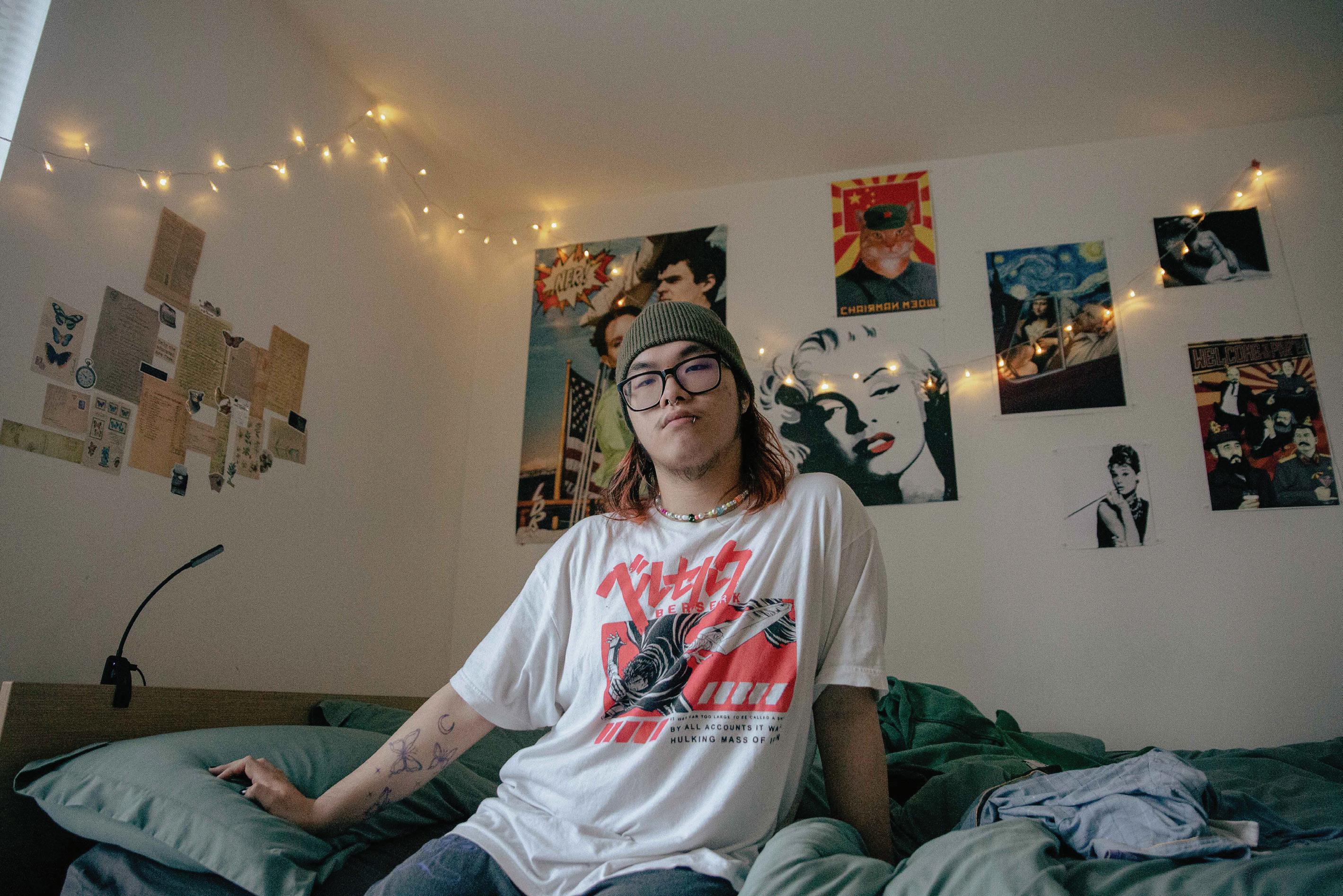
“I hate organizing things … I think it goes against the laws of the universe,” he said. “Entropy grows no matter what you do to it. You clean it, it’s gonna get messy [regardless]
— so why bother?” This attitude allows him to be “one with the room” and create an organic space rather than just a “site that you live in.”
A blank patch of wall remains in the corner of Tan’s room, marking the beginnings of a new project. He said it’s going to be dark academia-themed, with vintage-looking papers adorned with stickers. Against the wall beside his bed are several stacks of books.
Tan pulled out his current read: a secondhand book on Celtic culture. It wasn’t until he opened the book that he noticed something else was inside: an old newspaper clipping of an article titled, “Celtic Spirit Found in the Winding Path of History.”
“I was so surprised when I found it,” Tan said. “It fits perfectly on this wall.”
But just like how everything else in his room follows the second law of thermodynamics, entropy hasn’t brought it to the wall yet. “I don’t think its purpose belongs to the wall as of right now,” he said. “I think it belongs in my book as my bookmark.”
“It’ll end up on there when I’ve finished this book.”
finding home • january 17, 2023 • 07
As a Chinese Canadian who has lived between Canada and China through, second-year forestry student Sophy Wu’s concept of home lies in her identity as a global citizen and her interactions with the natural environment.
Wu was born in Montreal. At the age of four, her family moved to Shenzhen in the south of China, where they lived for ten years before moving back to Canada. Wu attended high school in Toronto, then moved to Vancouver to attend UBC.
Mandarin is Wu’s first language. Her lifestyle was largely influenced by her parents’ hometown of Taiyuan, a city in Northern China.
“I was not really identifying with my Canadian nationality yet at that point because I was attending [Chinese] public schools and all that,” said Wu. “It [was] a very thorough, authentic Chinese study experience,” contrasting with the education she would have gotten had she attended primary school in Canada.
Home for Wu has traversed landmasses and oceans within the frame of two short decades. “Growing up, I had [these] Western-Eastern, and then Northern-Southern [experiences] fused together.”
sophywu
Living in cities all her life has helped Wu to see them as her home on a larger scale. Starting in grade one, she relied on public transit to get around Shenzhen and explore different places. She also views school as an integral part of home — especially at the university level, where academic, social and personal spheres merge into one.
All of those dynamic aspects come into play when shaping her definition of home.
In her living space, Wu likes her surroundings to reflect her personality and interests. As someone passionate about sustainable urban design, she appreciates the open layout of her campus studio: its high ceilings and abundant storage to conceal clutter.

Wu’s mother, who still lives in Toronto and flew out to Vancouver to help her move, has left her imprint on Wu’s living space as well. “I’m trying to motivate myself to cook more,” Wu said, “so my mom has helped me set up sliced … vegetables so that when I cook noodles … I have a variety of stuff in it.”
Wu’s pantry is full of dry goods like noodles from her parents’ home province and congee, a Chinese rice porridge, that she can take on forestry field trips and mountain climbing.
Her wardrobe is a continuation of this theme of practicality. Inspired by the lush hues of the Pacific Northwest, Wu’s closet consists of deep greens, blues and browns. Even her desktop and iPad are green to match.
In the corner by the window is Wu’s plant collection — another trademark of a forestry student. All of them are from the UBC Botanical Garden and were cultivated locally, with several housed in eco-friendly containers. Front and centre is a pot Wu painted at a Forestry Undergraduate Society (FUS) event in her first year, with imagery of the four seasons wrapping around it.
“Whether it be in my room or my academic work or how I interact with people, they all very much reflect my values and my passions and my worldview,” Wu said.
This year, Wu has taken on roles as an orientation leader at Jump Start, VP external of the FUS and a UBC Sustainability Ambassador.
“I always uphold this image of [having] integrity and respect for people and [being] open-minded and compassionate as well.”
To Wu, home isn’t just where you come back to rest; you can carry it with you and spread it to others, too. U
08 • january 17, 2023 • finding home
Whether it be in my room or my academic work or how I interact with people, they
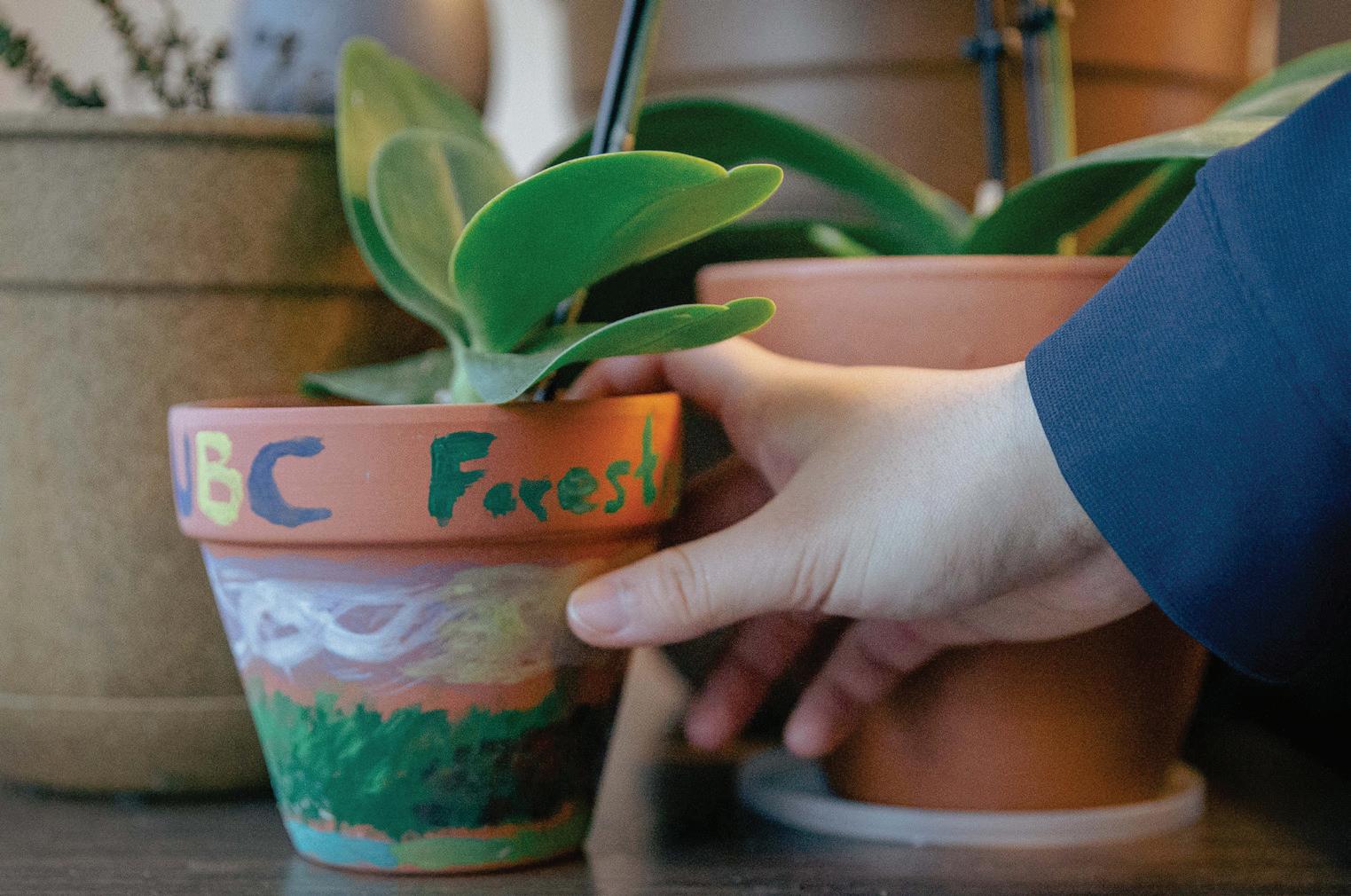


finding home • january 17, 2023 • 09
all very much reflect my values and my passions and my worldview.
“ “
y s
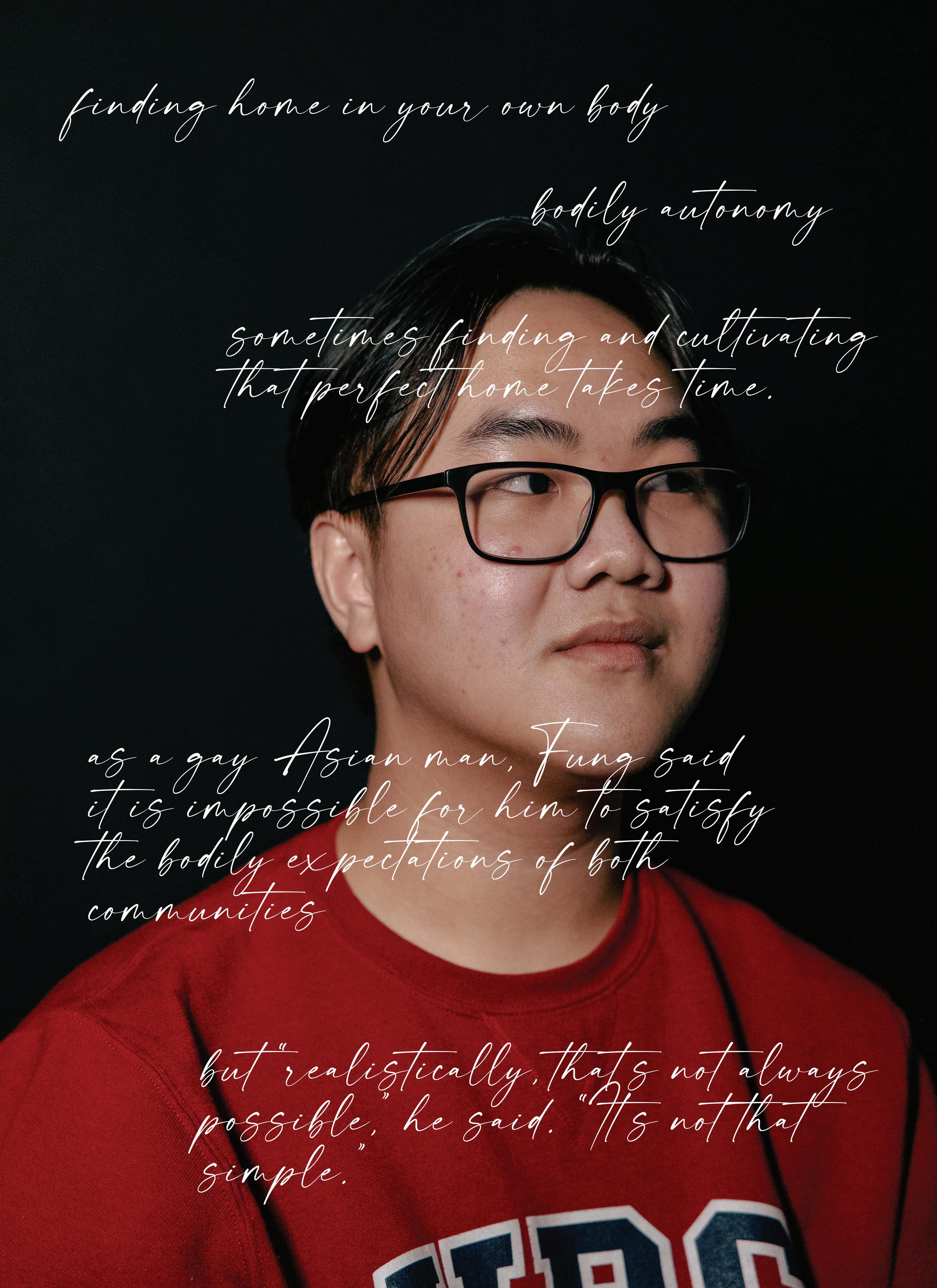
10 • january 17, 2023 • finding home
finding home in your own body.
words and photos by Isabella Falsetti
This article mentions body image and diet culture.
The definition of home can change throughout your life. It might be the house you grew up in, your first-year dorm or your first apartment as an adult. But the home that stays with you no matter what is your own body. And, just like the paint colour, furniture or even the floor plan of your house might change, the foundation remains the same.
Sometimes finding and cultivating that perfect home takes time.
For first-year Sauder student Gavin Fung, making his body feel like home has been a journey of self-acceptance.
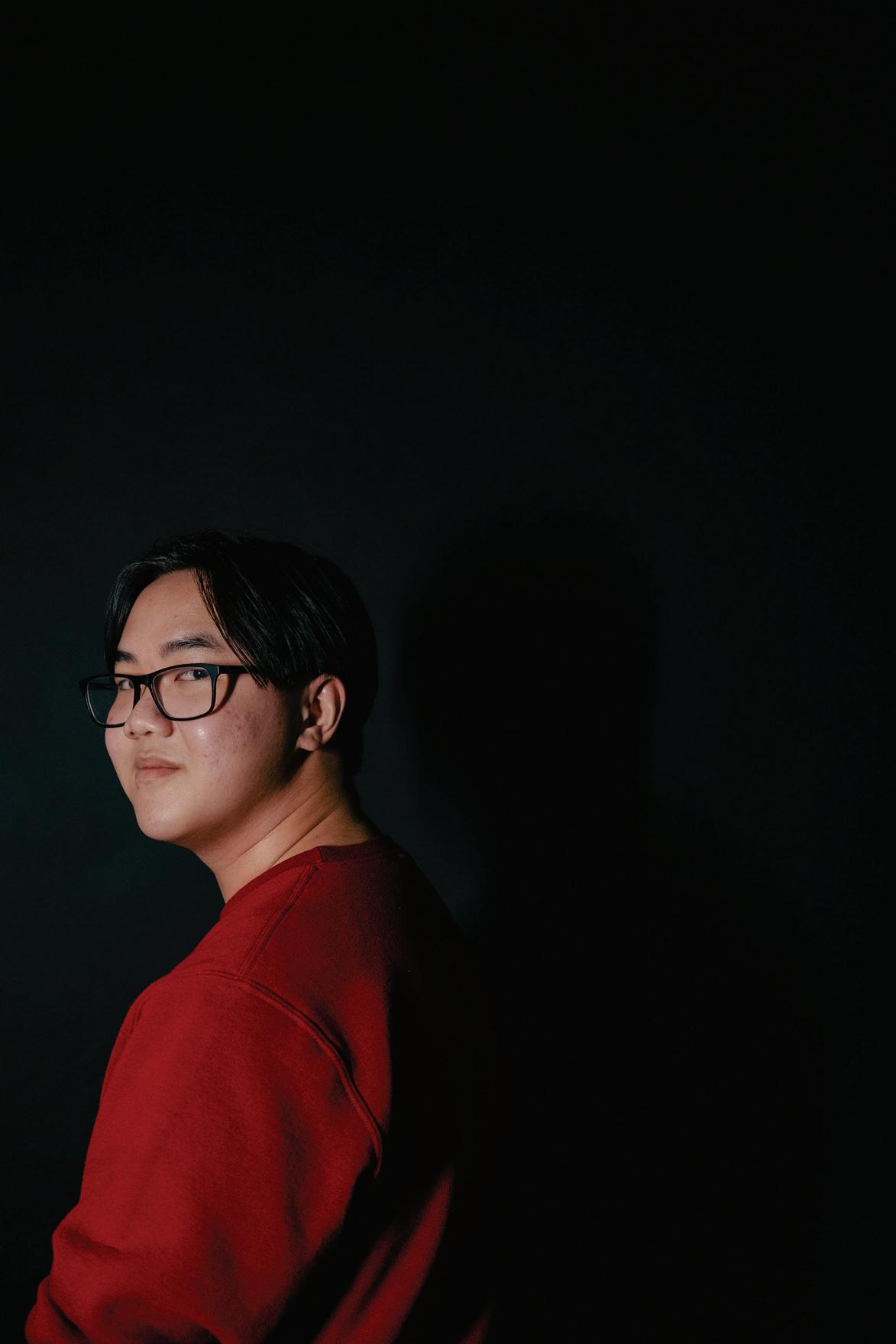
“I think, probably for the first 16 years of my life, it's [been] a lot of self hate,” Fung said. "I think it’s within the last two years that I really got comfortable with my body and being in my skin.”
A lot of it has been “pushing out the external hate” that stems from being at the intersection of the Asian and 2SLGBTQIA+ communities, Fung explained. He pointed out some of the inherent contradictions that exist between the bodily ideals of these two communities.
Based on Fung’s experience, weighing less and appearing thinner are valued in the Asian community. Meanwhile, men in the 2SLGBTQIA+ community are often expected to have perfectly sculpted and toned physiques.
As a gay Asian man, Fung said it is impossible for him to satisfy the bodily expectations of both communities.
Going home for the holidays and attending family gatherings can also mean subjecting oneself to remarks from relatives about body image and weight gain, as has been Fung's experience. Whether or not these comments are spoken with
malicious intent, they can be detrimental to one’s relationship with their body.
Over the past two years, Fung has tried to distance himself from the harmful expectations of these communities. For the most part, it’s been working.
To remedy some of the remaining internal dissatisfaction, Fung relies on self-care in the comfort of his dorm room. Most often, this consists of putting on a sheet mask and listening to Adele.
Fung said people often don’t expect him to be at the point of self-acceptance based on his appearance. For example, he usually opts for baggy clothing because it makes him feel comfortable.
What those people don’t understand, said Fung, is that form-fitting outfits do not equate to self-love. He observed that assumptions like this reinforce a toxic concept of self-love, where perceptions of our own relationships with our bodies are linked to how we look on a given day, and we are constantly told to love ourselves.
But “realistically, that’s not always possible,” he said. “It’s not that simple.”
Fung admits that sitting at home with a sheet mask may be a small act, but “because I’m able to give myself that time and that care I need, it allows me to view myself in a better light.”
Some days, Fung finds himself coming home exhausted after what may not have been the best of days. Then he’ll take a break, listen to some music, and remind himself: “I might not be doing the best, but I’m getting there.” U
Fung got permanent bracelets with his sister so they’d still be connected after he went away to university.

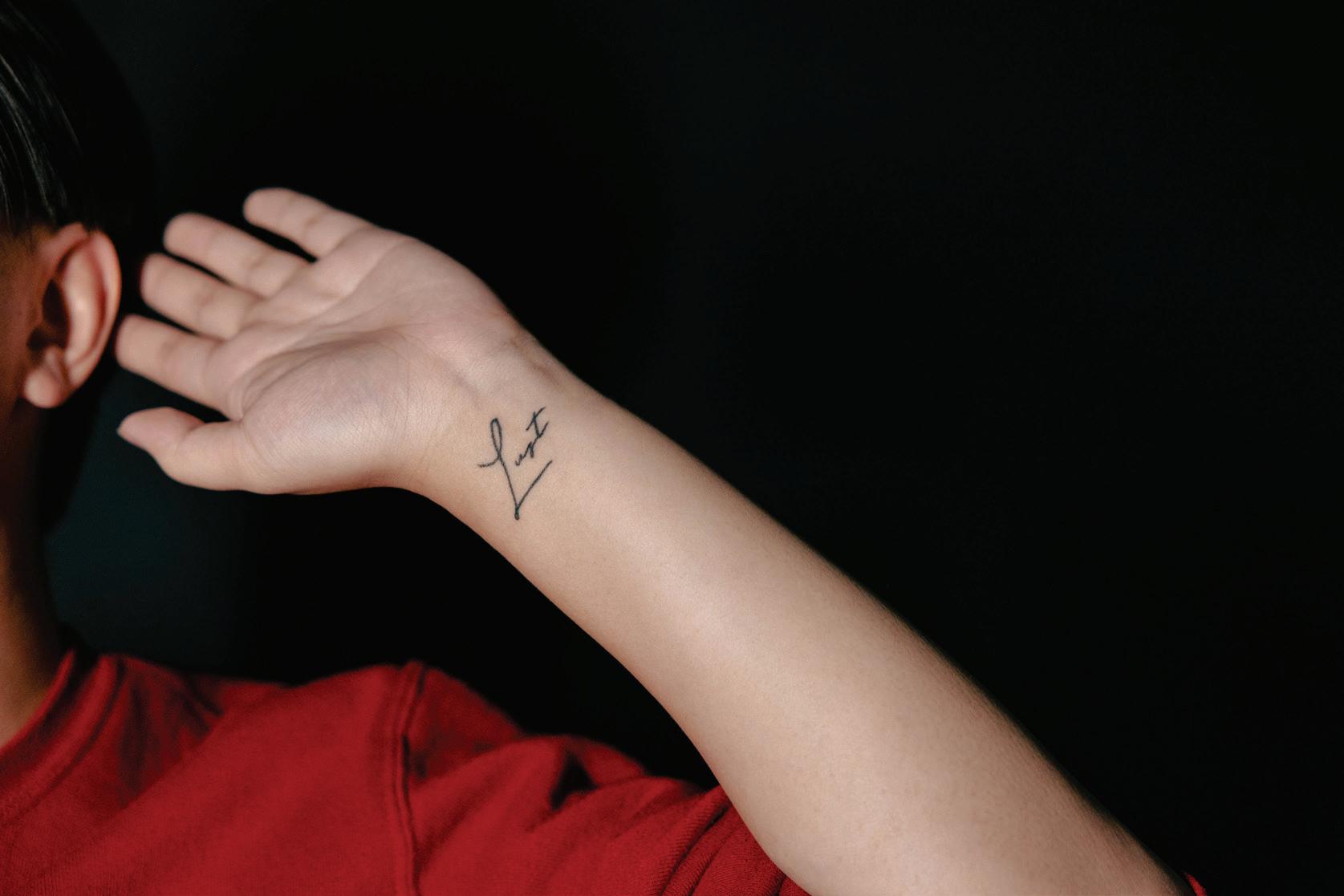
“Lust” was the word that was stamped on Fung’s arm when he entered his first gay club and drag show on his 18th birthday weekend.
finding home • january 17, 2023 • 11
finding home
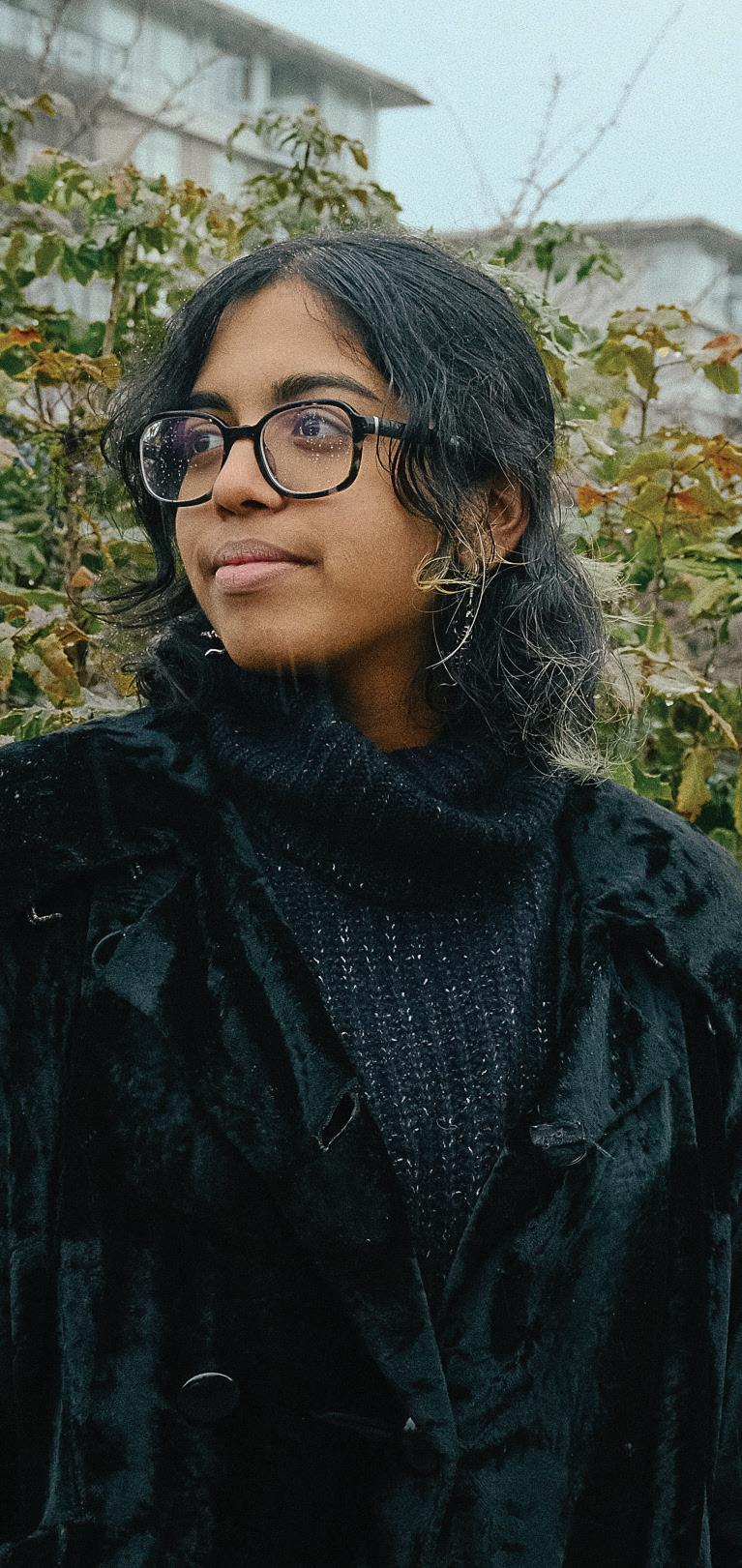
words and
photos by Isa S. You & Tatiana Zhandarmova
Going abroad for university can be an exciting experience — settling into a new country, immersing oneself in its culture and meeting new people who could become lifelong friends. It can also create a longing for the home left behind — especially if loved ones back home are experiencing hardship. Here are the stories of two UBC international students whose time in Canada has led them to reshape their definitions of home.
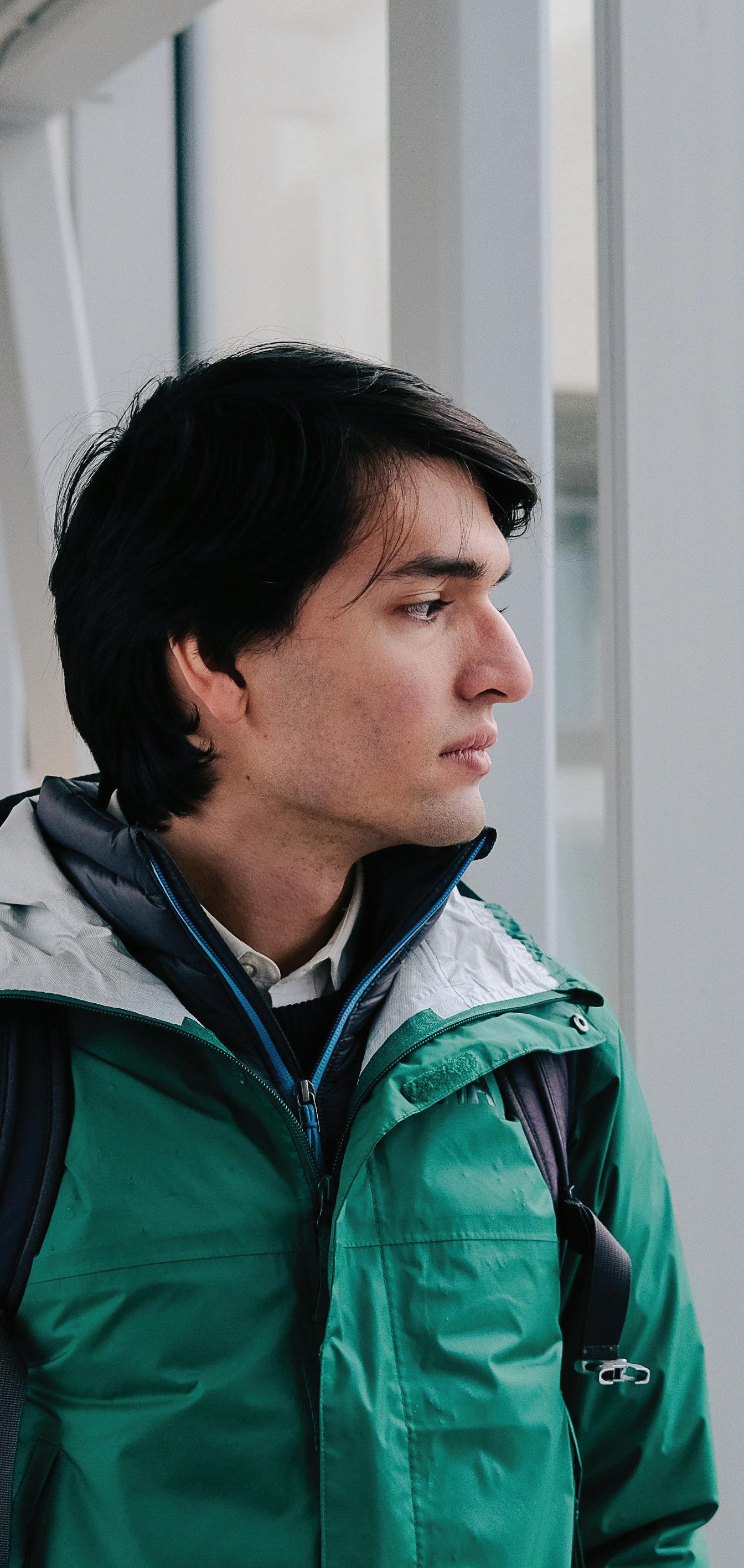
away home.from 12 • january 17, 2023 • finding home
shayan hosseini
Dictionaries often describe home as a place — of residence or of origin.
For third-year master’s of computer science student Shayan Hosseini, connecting with home is about connecting with the people important to him: his family, close friends and colleagues in Iran.
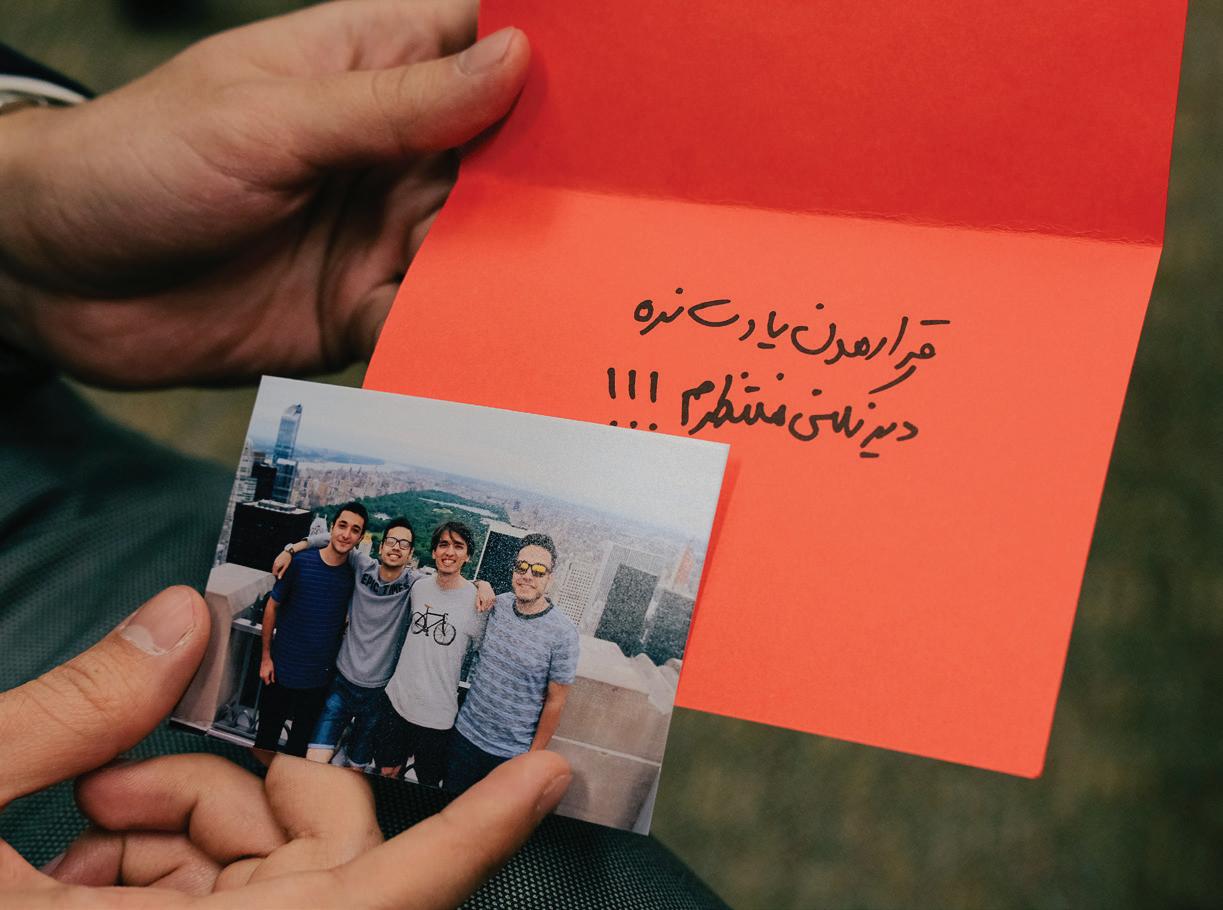

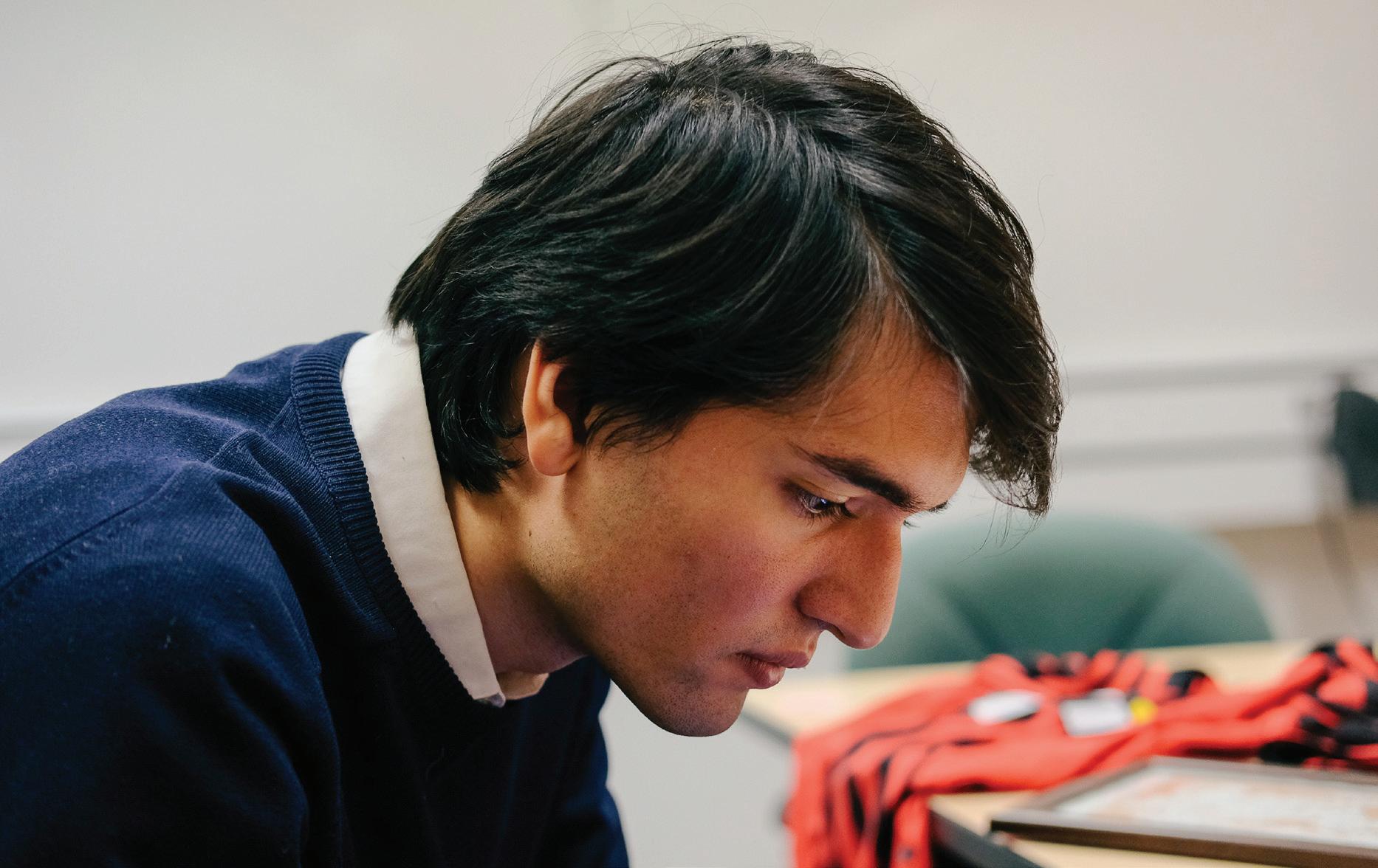
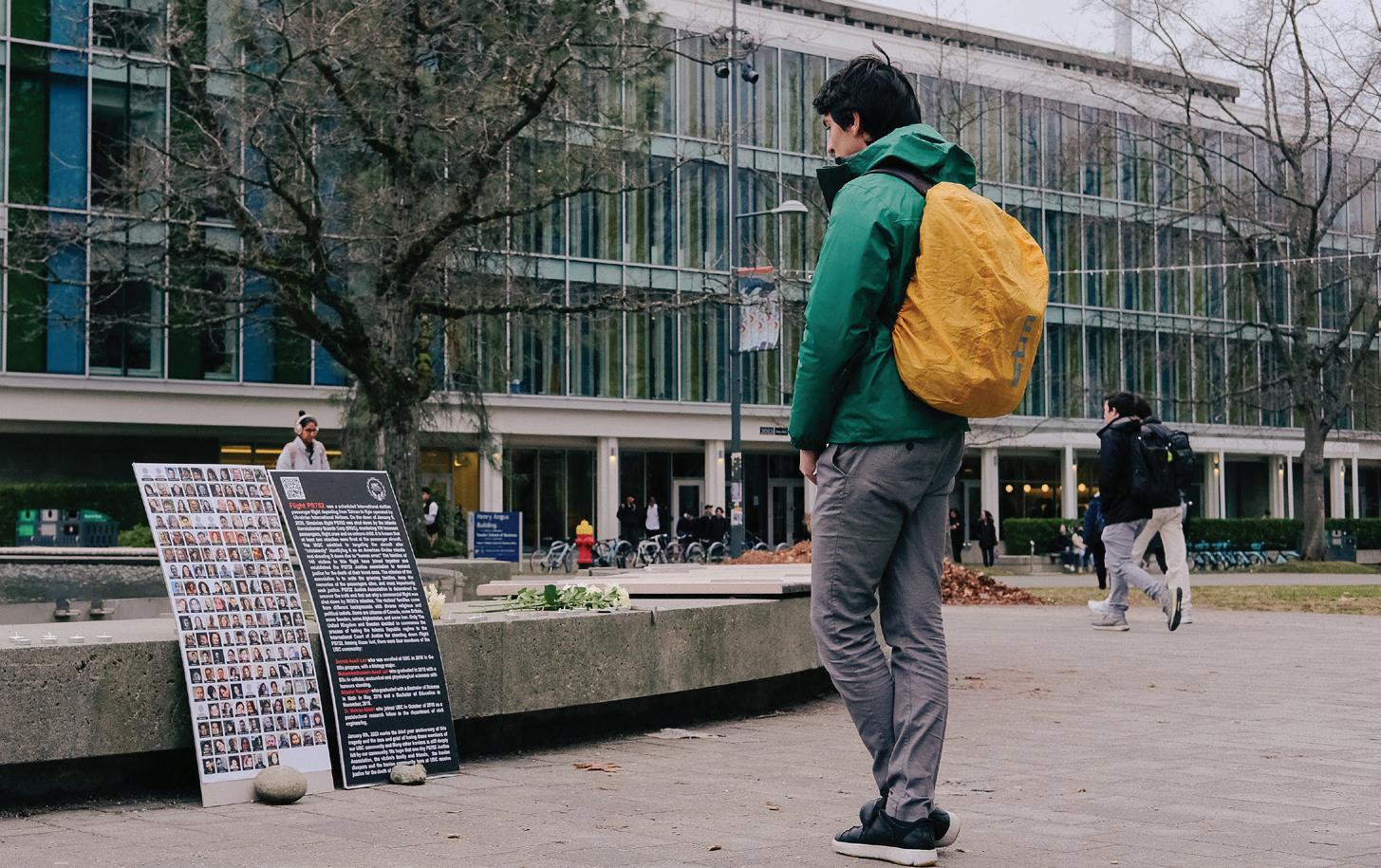
Hosseini began using technology to connect to family back home when both distance and the pandemic separated them.
“I came here in the middle of a pandemic. So just having Zoom calls, video calls was the normal thing of [those] days.”
Social media has also proven a useful tool for keeping in touch. “It’s impossible for me to see them in person,” said Hosseini. “So, the only way I have is the online way.”
But even then, the distance has also taken a toll on his relationships. “I have almost [a] 12hour time [difference],” said Hosseini.“When I’m sleeping, they’re active, and vice versa.”
And distance isn’t always necessarily physical. “The things that you have in common are from the past. You don’t make new memories together, you don’t deal with stuff together
right now,” he said.
This is further exacerbated by the ongoing unrest in Iran. Protests erupted within and beyond Iran in September 2022 following the death of 22-year-old Mahsa Amini at the hands of Iranian morality police while in custody. In addition to violent crackdowns on protests, the Iranian government has since implemented censorship in technology, making contact with loved ones much more fraught and difficult.
“WhatsApp got blocked. Instagram got blocked. It is very difficult to connect with my friends and family,” said Hosseini.
At first he found a workaround and bought VPNs for his family members and some friends, but then, restrictions escalated.
“At some point, no messaging app was working, so I had to email my family. One day my mom sent me an email with the subject line ‘greetings,’” said Hosseini. “It sounded weird to me, because we have never used emails for daily conversation and it was [a] very last resort thing that you can do.”
Beyond the censorship itself, Hosseini has also experienced a sort of balancing act, trying
to keep up with the news back home, while also trying to live his life in Vancouver — an experience he describes as “dual living.”
“I have a living here, and I have virtual living in Iran as well … you [have] to spend like 10 hours to follow up with this stuff that [is] going on there.”
Hosseini has since taken a step back from social media and begun focusing on advocacy work he can do in Vancouver.
“The minimum, the very basic thing is participating in the rallies that are in Vancouver, like every week. I do participate in them as much as I can.”
Hosseini has also previously given a presentation at the computer science department titled “Women’s Movement in Iran” which reviewed the living conditions of Iranian women in the past 40 years and previous uprisings.
“I guess that’s the very minimum thing that I could do for them … it might not necessarily help the people back there, but at least I feel better about myself that I’m doing something.”
finding home • january 17, 2023 • 13
“Home is where my family is.”
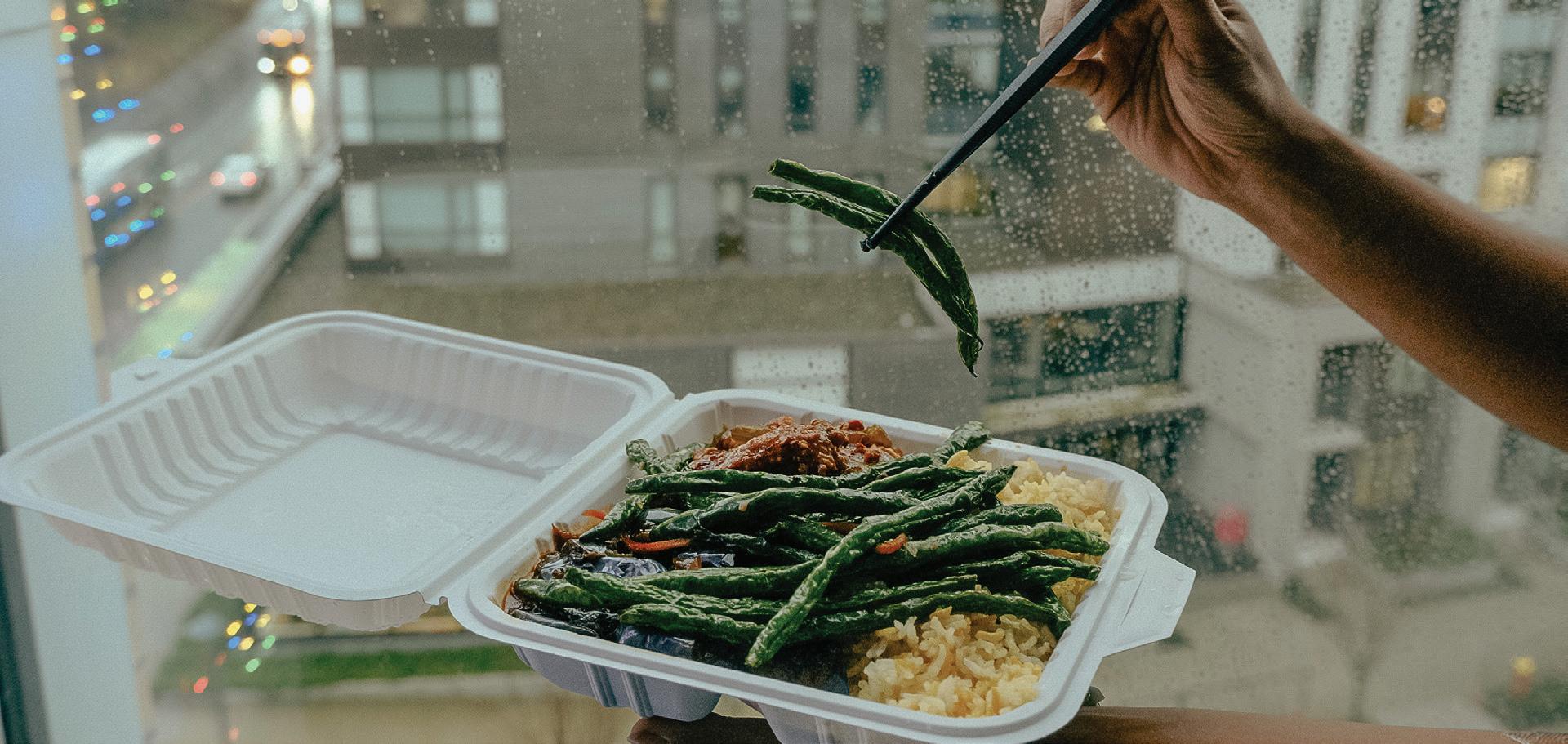
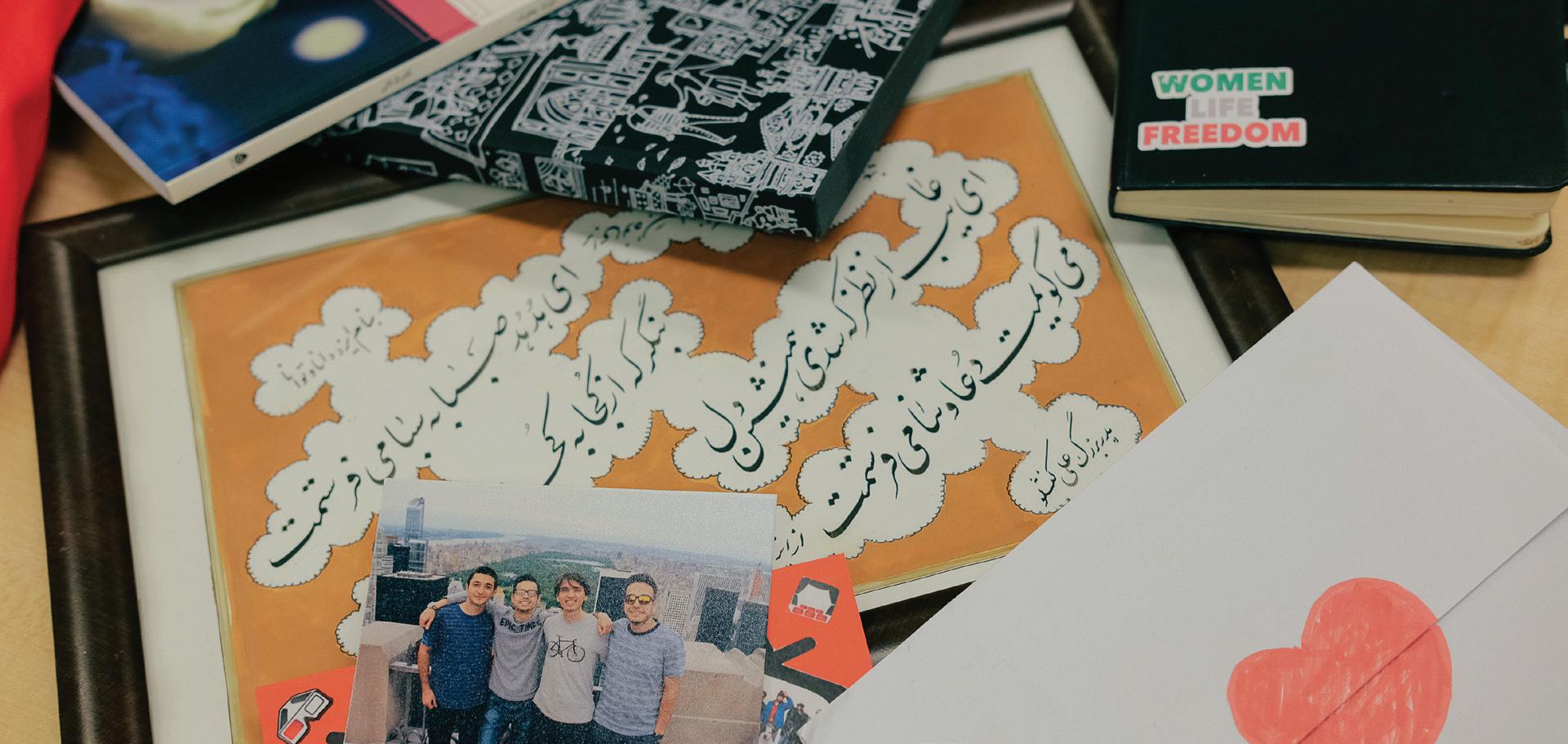
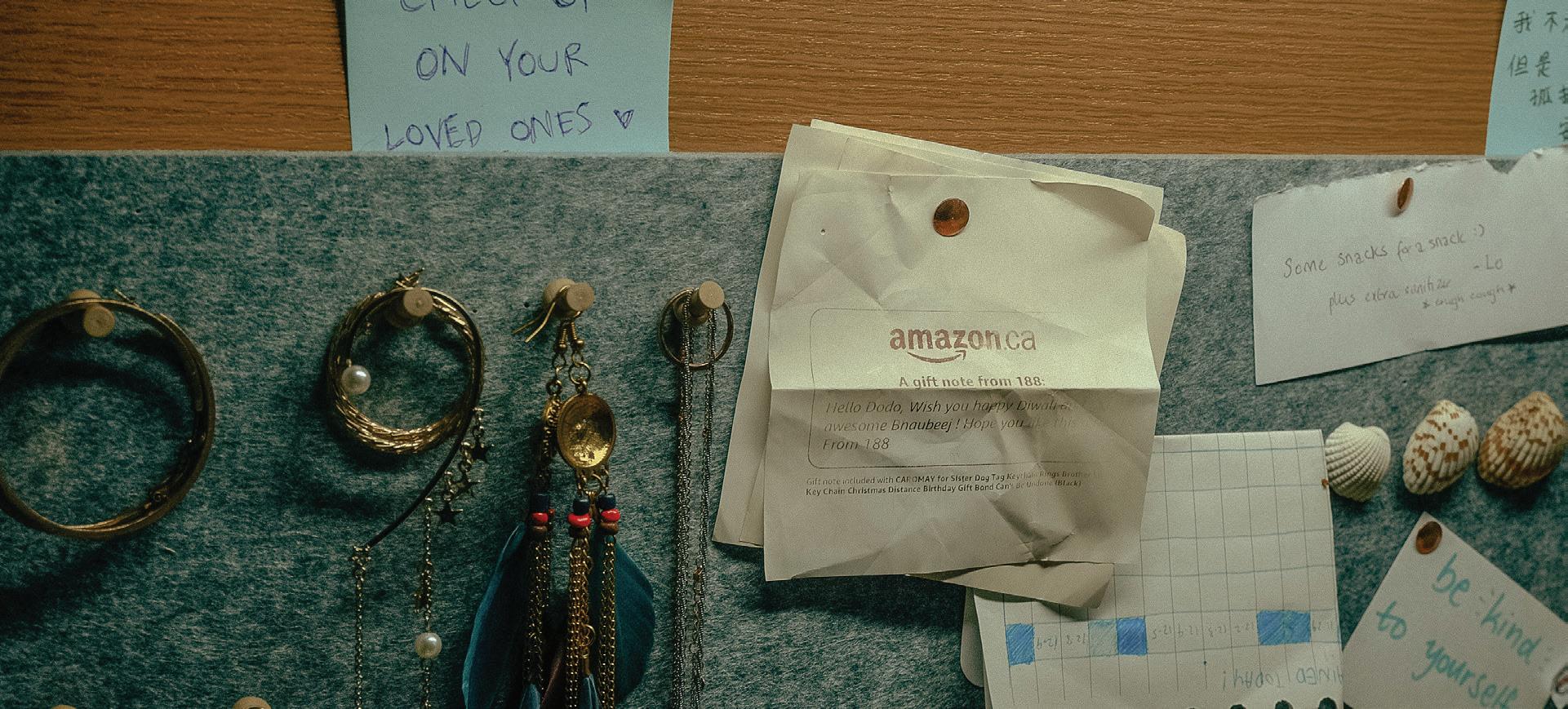
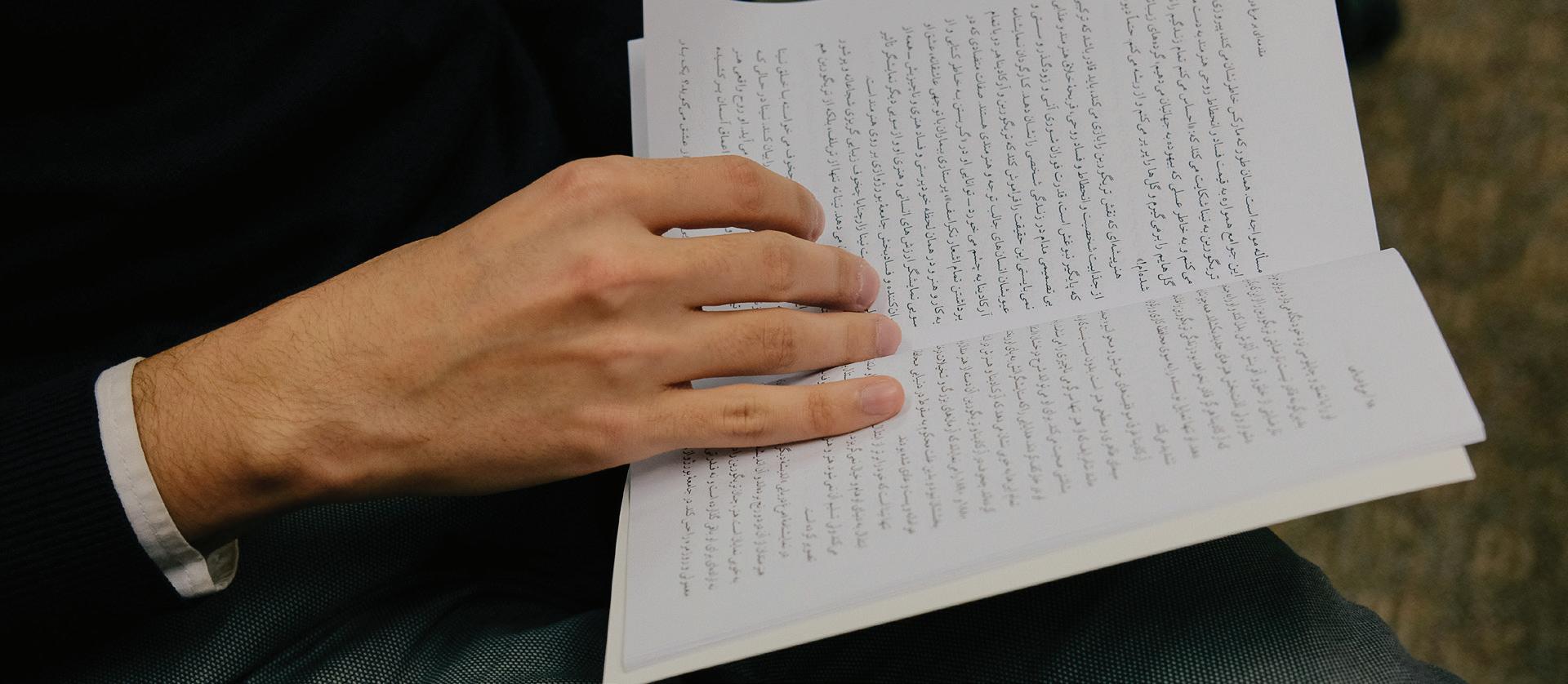
14 • january 17, 2023 • finding home
Third-year linguistics and psychology student Khushi Patil moved to Vancouver in 2021 from Shenzhen, China. Having divided her life between her birth country of India, China and now Canada, Patil struggles to define what home actually is.
“When I hear the word home, it’s an immediate conflict in my brain.”
Patil believes the meaning of home can be fluid — it does not necessarily have to be a physical place, as it can also be a sense of belonging and connection.
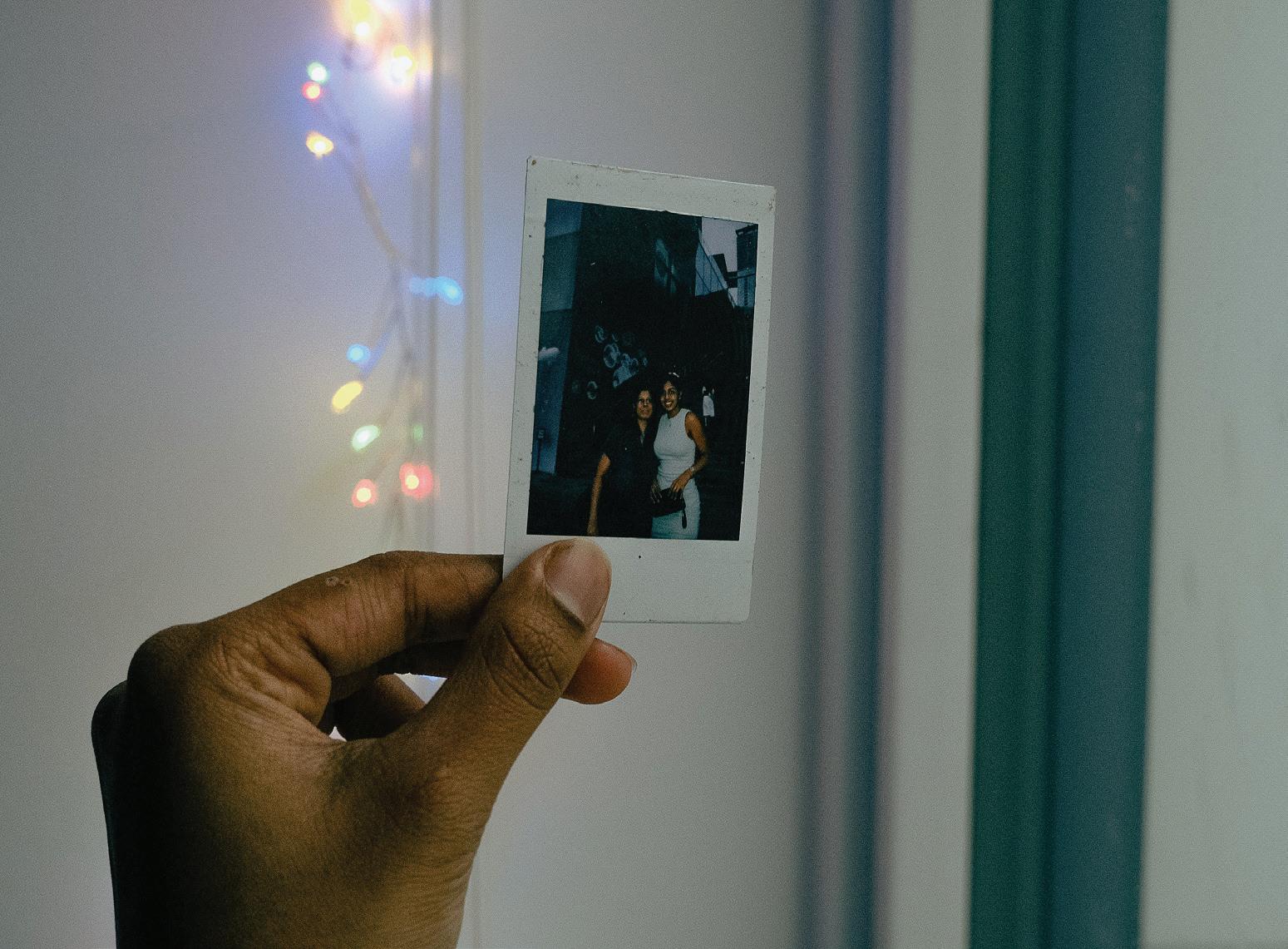
Since she moved to China with her family when she was three years old, she has developed a love for the country’s food.
“When I’m really feeling homesick, I get on a bus and go to Richmond — that is my escape route.”
At UBC, she has found comfort in the
khushi patil
International Food Court, where she orders the food she craves, in Mandarin. Patil often receives shocked reactions to her fluency in the language — even at the Chinese Students’ and Scholars’ Association (CSSA), where throughout online schooling she managed to find community.
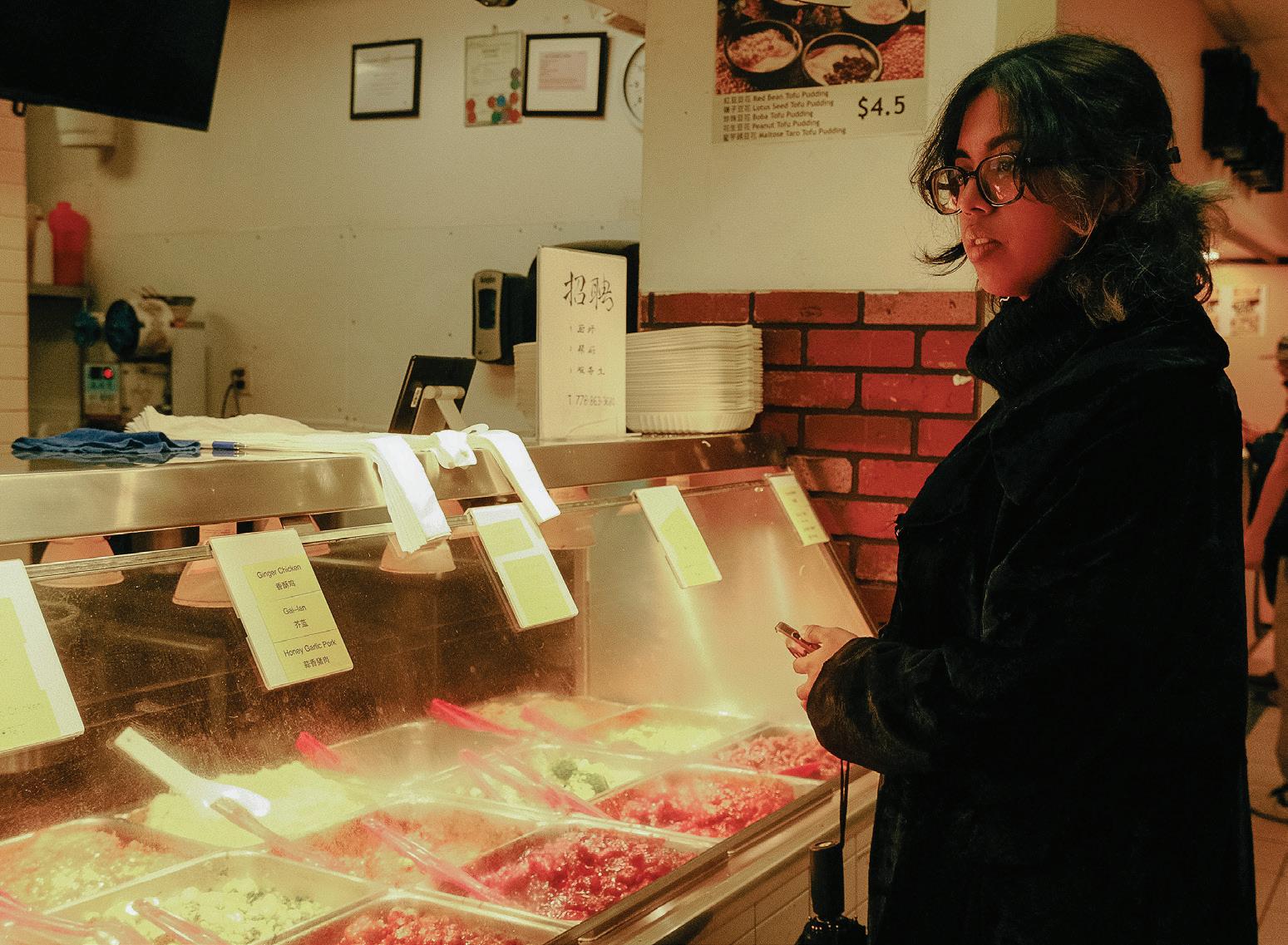
“[The CSSA has] massive group chats with people, so I felt very connected with that while I was in China. I went to some of the socials and over there, it felt quite natural,” Patil said.
However, in Vancouver, Patil no longer felt as comfortable in the CSSA as she did back in Shenzhen. “As someone who doesn’t typically, or stereotypically fit in, it didn’t exactly feel right.”
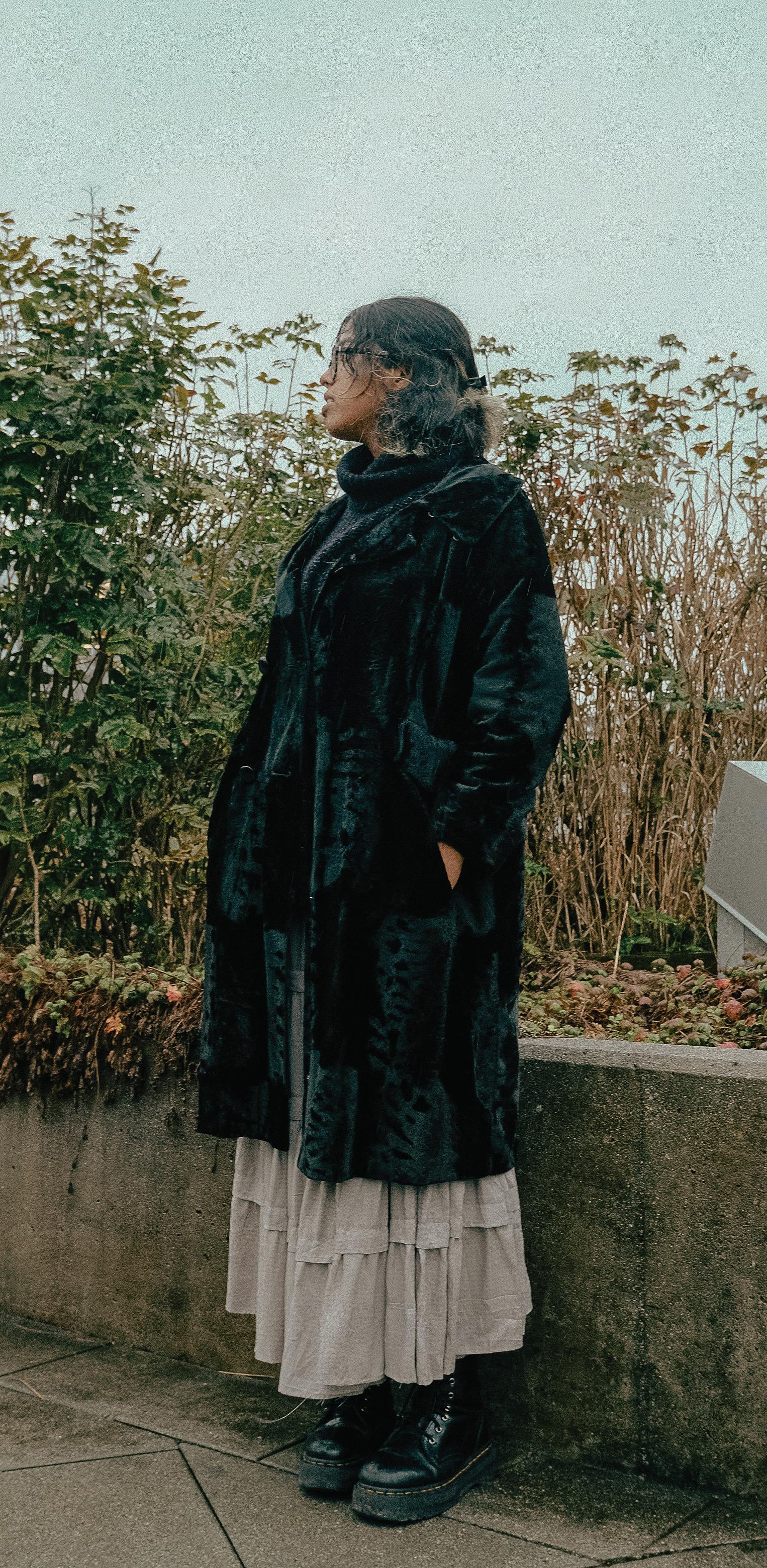
Instead, she managed to find community with friends from a similar path of life.
“One of my other friends — she’s like me. She’s from India, but she spent a lot of her life in Singapore and another bit of her life in China,”
Patil said. “And that’s what we bond over. One of my other closest friends was born and raised in Hong Kong. So, we all speak in Mandarin, go to Richmond, eat our meals, sometimes cook together.”
For Diwali, the celebration of life and the new year, Patil had friends from different countries over to celebrate. Preparing for the event, she filled her house with lots of food and handmade sweets. “I felt like I was embodying that cultural spirit in this foreign place,” she said.
Patil connects to home by keeping up with her parents and brother on a regular basis, and learning to create the foods of her culture(s).
“What I eventually settled on is ‘home’ is where my family is.” U
finding home • january 17, 2023 • 15
Khushi Patil is a staff writer at The Ubyssey. She was not involved in the writing or editing of this piece.

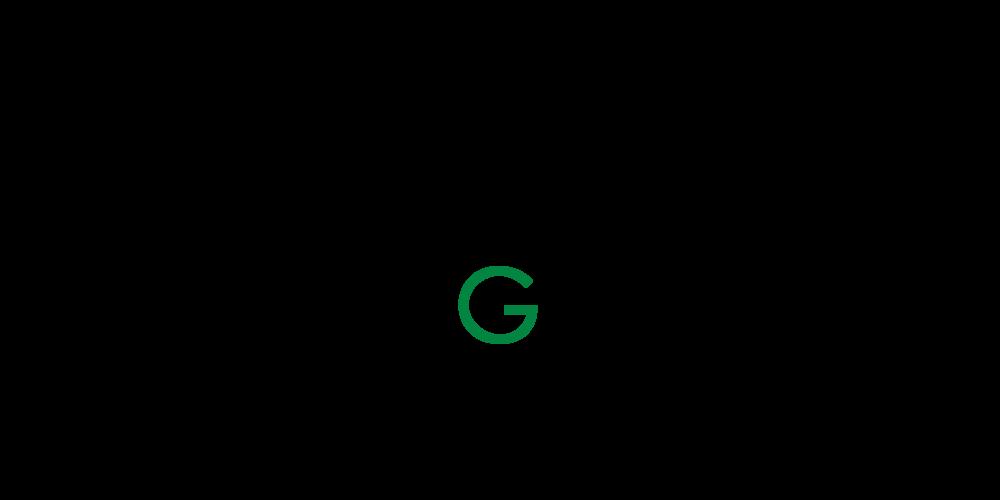


5 BUCK 5 BUCK SAME DAY SAME DAY DELIVERY DELIVERY Vancouver's First Retail Cannabis Store™ Evergreen Cannabis is a private retailer of legal, non medical cannabis. You must be 19 years of age or older to purchase cannabis ID is checked on premises Trademarks are the property of Evergreen Cannabis Inc. All rights reserved. Open 9am - 11pm Daily 2868 West 4th Ave (604) 900-1714 NEED A STUDY BREAK? Student Sundays [19+] or Take the #4, Door to Door! No Minimum Order No Minimum Order Exclusives / Craft / Micro Exclusives / Craft / Micro ADVERTISEMENT








































